- Home
- Joseph Conrad
Under Western Eyes Page 2
Under Western Eyes Read online
Page 2
I
In the conduct of an invented story there are, no doubt, certainproprieties to be observed for the sake of clearness and effect. A manof imagination, however inexperienced in the art of narrative, has hisinstinct to guide him in the choice of his words, and in the developmentof the action. A grain of talent excuses many mistakes. But this is nota work of imagination; I have no talent; my excuse for this undertakinglies not in its art, but in its artlessness. Aware of my limitations andstrong in the sincerity of my purpose, I would not try (were I able) toinvent anything. I push my scruples so far that I would not even inventa transition.
Dropping then Mr. Razumov's record at the point where CouncillorMikulin's question "Where to?" comes in with the force of an insolubleproblem, I shall simply say that I made the acquaintance of these ladiesabout six months before that time. By "these ladies" I mean, of course,the mother and the sister of the unfortunate Haldin.
By what arguments he had induced his mother to sell their littleproperty and go abroad for an indefinite time, I cannot tell precisely.I have an idea that Mrs. Haldin, at her son's wish, would have set fireto her house and emigrated to the moon without any sign of surprise orapprehension; and that Miss Haldin--Nathalie, caressingly Natalka--wouldhave given her assent to the scheme.
Their proud devotion to that young man became clear to me in avery short time. Following his directions they went straight toSwitzerland--to Zurich--where they remained the best part of a year.From Zurich, which they did not like, they came to Geneva. A friendof mine in Lausanne, a lecturer in history at the University (he hadmarried a Russian lady, a distant connection of Mrs. Haldin's), wrote tome suggesting I should call on these ladies. It was a very kindlymeant business suggestion. Miss Haldin wished to go through a course ofreading the best English authors with a competent teacher.
Mrs. Haldin received me very kindly. Her bad French, of which she wassmilingly conscious, did away with the formality of the first interview.She was a tall woman in a black silk dress. A wide brow, regularfeatures, and delicately cut lips, testified to her past beauty. She satupright in an easy chair and in a rather weak, gentle voice told me thather Natalka simply thirsted after knowledge. Her thin hands were lyingon her lap, her facial immobility had in it something monachal. "InRussia," she went on, "all knowledge was tainted with falsehood. Notchemistry and all that, but education generally," she explained.The Government corrupted the teaching for its own purposes. Both herchildren felt that. Her Natalka had obtained a diploma of a SuperiorSchool for Women and her son was a student at the St. PetersburgUniversity. He had a brilliant intellect, a most noble unselfish nature,and he was the oracle of his comrades. Early next year, she hoped hewould join them and they would then go to Italy together. In any othercountry but their own she would have been certain of a great future fora man with the extraordinary abilities and the lofty character of herson--but in Russia....
The young lady sitting by the window turned her head and said--
"Come, mother. Even with us things change with years."
Her voice was deep, almost harsh, and yet caressing in its harshness.She had a dark complexion, with red lips and a full figure. She gave theimpression of strong vitality. The old lady sighed.
"You are both young--you two. It is easy for you to hope. But I, too, amnot hopeless. Indeed, how could I be with a son like this."
I addressed Miss Haldin, asking her what authors she wished to read. Shedirected upon me her grey eyes shaded by black eyelashes, and Ibecame aware, notwithstanding my years, how attractive physicallyher personality could be to a man capable of appreciating in a womansomething else than the mere grace of femininity. Her glance was asdirect and trustful as that of a young man yet unspoiled by the world'swise lessons. And it was intrepid, but in this intrepidity therewas nothing aggressive. A naive yet thoughtful assurance is a betterdefinition. She had reflected already (in Russia the young begin tothink early), but she had never known deception as yet because obviouslyshe had never yet fallen under the sway of passion. She was--to look ather was enough--very capable of being roused by an idea or simply bya person. At least, so I judged with I believe an unbiassed mind; forclearly my person could not be the person--and as to my ideas!...
We became excellent friends in the course of our reading. It was verypleasant. Without fear of provoking a smile, I shall confess that Ibecame very much attached to that young girl. At the end of fourmonths I told her that now she could very well go on reading Englishby herself. It was time for the teacher to depart. My pupil lookedunpleasantly surprised.
Mrs. Haldin, with her immobility of feature and kindly expression of theeyes, uttered from her armchair in her uncertain French, "_Mais l'amireviendra._" And so it was settled. I returned--not four times a weekas before, but pretty frequently. In the autumn we made some shortexcursions together in company with other Russians. My friendship withthese ladies gave me a standing in the Russian colony which otherwise Icould not have had.
The day I saw in the papers the news of Mr. de P---'s assassination--itwas a Sunday--I met the two ladies in the street and walked with themfor some distance. Mrs. Haldin wore a heavy grey cloak, I remember,over her black silk dress, and her fine eyes met mine with a very quietexpression.
"We have been to the late service," she said. "Natalka came with me.Her girl-friends, the students here, of course don't.... With us inRussia the church is so identified with oppression, that it seems almostnecessary when one wishes to be free in this life, to give up all hopeof a future existence. But I cannot give up praying for my son."
She added with a sort of stony grimness, colouring slightly, andin French, "_Ce n'est peut etre qu'une habitude._" ("It may be onlyhabit.")
Miss Haldin was carrying the prayer-book. She did not glance at hermother.
"You and Victor are both profound believers," she said.
I communicated to them the news from their country which I had justread in a cafe. For a whole minute we walked together fairly briskly insilence. Then Mrs. Haldin murmured--
"There will be more trouble, more persecutions for this. They may beeven closing the University. There is neither peace nor rest in Russiafor one but in the grave.
"Yes. The way is hard," came from the daughter, looking straight beforeher at the Chain of Jura covered with snow, like a white wall closingthe end of the street. "But concord is not so very far off."
"That is what my children think," observed Mrs. Haldin to me.
I did not conceal my feeling that these were strange times to talk ofconcord. Nathalie Haldin surprised me by saying, as if she had thoughtvery much on the subject, that the occidentals did not understand thesituation. She was very calm and youthfully superior.
"You think it is a class conflict, or a conflict of interests, associal contests are with you in Europe. But it is not that at all. It issomething quite different."
"It is quite possible that I don't understand," I admitted.
That propensity of lifting every problem from the plane of theunderstandable by means of some sort of mystic expression, is veryRussian. I knew her well enough to have discovered her scorn for allthe practical forms of political liberty known to the western world.I suppose one must be a Russian to understand Russian simplicity, aterrible corroding simplicity in which mystic phrases clothe a naive andhopeless cynicism. I think sometimes that the psychological secretof the profound difference of that people consists in this, that theydetest life, the irremediable life of the earth as it is, whereaswe westerners cherish it with perhaps an equal exaggeration of itssentimental value. But this is a digression indeed....
I helped these ladies into the tramcar and they asked me to call inthe afternoon. At least Mrs. Haldin asked me as she climbed up, and herNatalka smiled down at the dense westerner indulgently from the rearplatform of the moving car. The light of the clear wintry forenoon wassoftened in her grey eyes.
Mr. Razumov's record, like the open book of fate, revives for me thememory of that day as something startling
ly pitiless in its freedom fromall forebodings. Victor Haldin was still with the living, but with theliving whose only contact with life is the expectation of death. He musthave been already referring to the last of his earthly affections, thehours of that obstinate silence, which for him was to be prolonged intoeternity. That afternoon the ladies entertained a good many of theircompatriots--more than was usual for them to receive at one time; andthe drawing-room on the ground floor of a large house on the Boulevarddes Philosophes was very much crowded.
I outstayed everybody; and when I rose Miss Haldin stood up too. I tookher hand and was moved to revert to that morning's conversation in thestreet.
"Admitting that we occidentals do not understand the character ofyour..." I began.
It was as if she had been prepared for me by some mysteriousfore-knowledge. She checked me gently--
"Their impulses--their..." she sought the proper expression and foundit, but in French..."their _mouvements d'ame._"
Her voice was not much above a whisper.
"Very well," I said. "But still we are looking at a conflict. You sayit is not a conflict of classes and not a conflict of interests. SupposeI admitted that. Are antagonistic ideas then to be reconciled moreeasily--can they be cemented with blood and violence into that concordwhich you proclaim to be so near?"
She looked at me searchingly with her clear grey eyes, without answeringmy reasonable question--my obvious, my unanswerable question.
"It is inconceivable," I added, with something like annoyance.
"Everything is inconceivable," she said. "The whole world isinconceivable to the strict logic of ideas. And yet the world exists toour senses, and we exist in it. There must be a necessity superior toour conceptions. It is a very miserable and a very false thing to belongto the majority. We Russians shall find some better form of nationalfreedom than an artificial conflict of parties--which is wrong becauseit is a conflict and contemptible because it is artificial. It is leftfor us Russians to discover a better way."
Mrs. Haldin had been looking out of the window. She turned upon me thealmost lifeless beauty of her face, and the living benign glance of herbig dark eyes.
"That's what my children think," she declared.
"I suppose," I addressed Miss Haldin, "that you will be shocked if Itell you that I haven't understood--I won't say a single word; I'veunderstood all the words.... But what can be this era of disembodiedconcord you are looking forward to. Life is a thing of form. It has itsplastic shape and a definite intellectual aspect. The most idealisticconceptions of love and forbearance must be clothed in flesh as it werebefore they can be made understandable."
I took my leave of Mrs. Haldin, whose beautiful lips never stirred. Shesmiled with her eyes only. Nathalie Haldin went with me as far as thedoor, very amiable.
"Mother imagines that I am the slavish echo of my brother Victor. Itis not so. He understands me better than I can understand him. When hejoins us and you come to know him you will see what an exceptional soulit is." She paused. "He is not a strong man in the conventional sense,you know," she added. "But his character is without a flaw."
"I believe that it will not be difficult for me to make friends withyour brother Victor."
"Don't expect to understand him quite," she said, a little maliciously."He is not at all--at all--western at bottom."
And on this unnecessary warning I left the room with another bow inthe doorway to Mrs. Haldin in her armchair by the window. The shadow ofautocracy all unperceived by me had already fallen upon the Boulevarddes Philosophes, in the free, independent and democratic city ofGeneva, where there is a quarter called "La Petite Russie." Whenever twoRussians come together, the shadow of autocracy is with them, tingingtheir thoughts, their views, their most intimate feelings, their privatelife, their public utterances--haunting the secret of their silences.
What struck me next in the course of a week or so was the silence ofthese ladies. I used to meet them walking in the public garden near theUniversity. They greeted me with their usual friendliness, but I couldnot help noticing their taciturnity. By that time it was generally knownthat the assassin of M. de P--- had been caught, judged, and executed.So much had been declared officially to the news agencies. But for theworld at large he remained anonymous. The official secrecy had withheldhis name from the public. I really cannot imagine for what reason.
One day I saw Miss Haldin walking alone in the main valley of theBastions under the naked trees.
"Mother is not very well," she explained.
As Mrs. Haldin had, it seemed, never had a day's illness in her life,this indisposition was disquieting. It was nothing definite, too.
"I think she is fretting because we have not heard from my brother forrather a long time."
"No news--good news," I said cheerfully, and we began to walk slowlyside by side.
"Not in Russia," she breathed out so low that I only just caught thewords. I looked at her with more attention.
"You too are anxious?"
She admitted after a moment of hesitation that she was.
"It is really such a long time since we heard...."
And before I could offer the usual banal suggestions she confided in me.
"Oh! But it is much worse than that. I wrote to a family we know inPetersburg. They had not seen him for more than a month. They thoughthe was already with us. They were even offended a little that he shouldhave left Petersburg without calling on them. The husband of the ladywent at once to his lodgings. Victor had left there and they did notknow his address."
I remember her catching her breath rather pitifully. Her brother had notbeen seen at lectures for a very long time either. He only turned up nowand then at the University gate to ask the porter for his letters. Andthe gentleman friend was told that the student Haldin did not come toclaim the last two letters for him. But the police came to inquire ifthe student Haldin ever received any correspondence at the Universityand took them away.
"My two last letters," she said.
We faced each other. A few snow-flakes fluttered under the naked boughs.The sky was dark.
"What do you think could have happened?" I asked.
Her shoulders moved slightly.
"One can never tell--in Russia."
I saw then the shadow of autocracy lying upon Russian lives in theirsubmission or their revolt. I saw it touch her handsome open facenestled in a fur collar and darken her clear eyes that shone upon mebrilliantly grey in the murky light of a beclouded, inclement afternoon.
"Let us move on," she said. "It is cold standing--to-day."
She shuddered a little and stamped her little feet. We moved briskly tothe end of the alley and back to the great gates of the garden.
"Have you told your mother?" I ventured to ask.
"No. Not yet. I came out to walk off the impression of this letter."
I heard a rustle of paper somewhere. It came from her muff. She had theletter with her in there.
"What is it that you are afraid of?" I asked.
To us Europeans of the West, all ideas of political plots andconspiracies seem childish, crude inventions for the theatre or a novel.I did not like to be more definite in my inquiry.
"For us--for my mother specially, what I am afraid of is incertitude.People do disappear. Yes, they do disappear. I leave you to imagine whatit is--the cruelty of the dumb weeks--months--years! This friend of ourshas abandoned his inquiries when he heard of the police getting hold ofthe letters. I suppose he was afraid of compromising himself. He has awife and children--and why should he, after all.... Moreover, he iswithout influential connections and not rich. What could he do?...Yes, I am afraid of silence--for my poor mother. She won't be ableto bear it. For my brother I am afraid of..." she became almostindistinct, "of anything."
We were now near the gate opposite the theatre. She raised her voice.
"But lost people do turn up even in Russia. Do you know what my lasthope is? Perhaps the next thing we know, we shall see him walking intoou
r rooms."
I raised my hat and she passed out of the gardens, graceful and strong,after a slight movement of the head to me, her hands in the muff,crumpling the cruel Petersburg letter.
On returning home I opened the newspaper I receive from London, andglancing down the correspondence from Russia--not the telegrams butthe correspondence--the first thing that caught my eye was the nameof Haldin. Mr. de P---'s death was no longer an actuality, but theenterprising correspondent was proud of having ferreted out someunofficial information about that fact of modern history. He had gothold of Haldin's name, and had picked up the story of the midnightarrest in the street. But the sensation from a journalistic point ofview was already well in the past. He did not allot to it more thantwenty lines out of a full column. It was quite enough to give me asleepless night. I perceived that it would have been a sort of treasonto let Miss Haldin come without preparation upon that journalisticdiscovery which would infallibly be reproduced on the morrow by Frenchand Swiss newspapers. I had a very bad time of it till the morning,wakeful with nervous worry and night-marish with the feeling ofbeing mixed up with something theatrical and morbidly affected. Theincongruity of such a complication in those two women's lives wassensible to me all night in the form of absolute anguish. It seemed dueto their refined simplicity that it should remain concealed from themfor ever. Arriving at an unconscionably early hour at the door of theirapartment, I felt as if I were about to commit an act of vandalism....
The middle-aged servant woman led me into the drawing-room where therewas a duster on a chair and a broom leaning against the centre table.The motes danced in the sunshine; I regretted I had not written a letterinstead of coming myself, and was thankful for the brightness of theday. Miss Haldin in a plain black dress came lightly out of her mother'sroom with a fixed uncertain smile on her lips.
I pulled the paper out of my pocket. I did not imagine that a numberof the _Standard_ could have the effect of Medusa's head. Her face wentstony in a moment--her eyes--her limbs. The most terrible thing was thatbeing stony she remained alive. One was conscious of her palpitatingheart. I hope she forgave me the delay of my clumsy circumlocution. Itwas not very prolonged; she could not have kept so still from head tofoot for more than a second or two; and then I heard her draw a breath.As if the shock had paralysed her moral resistance, and affected thefirmness of her muscles, the contours of her face seemed to have givenway. She was frightfully altered. She looked aged--ruined. But only fora moment. She said with decision--
"I am going to tell my mother at once."
"Would that be safe in her state?" I objected.
"What can be worse than the state she has been in for the last month?We understand this in another way. The crime is not at his door. Don'timagine I am defending him before you."
She went to the bedroom door, then came back to ask me in a low murmurnot to go till she returned. For twenty interminable minutes not a soundreached me. At last Miss Haldin came out and walked across the room withher quick light step. When she reached the armchair she dropped into itheavily as if completely exhausted.
Mrs. Haldin, she told me, had not shed a tear. She was sitting up inbed, and her immobility, her silence, were very alarming. At last shelay down gently and had motioned her daughter away.
"She will call me in presently," added Miss Haldin. "I left a bell nearthe bed."
I confess that my very real sympathy had no standpoint. The Westernreaders for whom this story is written will understand what I mean. Itwas, if I may say so, the want of experience. Death is a remorselessspoliator. The anguish of irreparable loss is familiar to us all. Thereis no life so lonely as to be safe against that experience. But thegrief I had brought to these two ladies had gruesome associations. Ithad the associations of bombs and gallows--a lurid, Russian colouringwhich made the complexion of my sympathy uncertain.
I was grateful to Miss Haldin for not embarrassing me by an outwarddisplay of deep feeling. I admired her for that wonderful commandover herself, even while I was a little frightened at it. It was thestillness of a great tension. What if it should suddenly snap? Even thedoor of Mrs. Haldin's room, with the old mother alone in there, had arather awful aspect.
Nathalie Haldin murmured sadly--
"I suppose you are wondering what my feelings are?"
Essentially that was true. It was that very wonder which unsettled mysympathy of a dense Occidental. I could get hold of nothing but of somecommonplace phrases, those futile phrases that give the measure of ourimpotence before each other's trials I mumbled something to the effectthat, for the young, life held its hopes and compensations. It heldduties too--but of that I was certain it was not necessary to remindher.
She had a handkerchief in her hands and pulled at it nervously.
"I am not likely to forget my mother," she said. "We used to be three.Now we are two--two women. She's not so very old. She may live quite along time yet. What have we to look for in the future? For what hopeand what consolation?"
"You must take a wider view," I said resolutely, thinking that with thisexceptional creature this was the right note to strike. She looked atme steadily for a moment, and then the tears she had been keeping downflowed unrestrained. She jumped up and stood in the window with her backto me.
I slipped away without attempting even to approach her. Next day I wastold at the door that Mrs. Haldin was better. The middle-aged servantremarked that a lot of people--Russians--had called that day, but MissHaldin bad not seen anybody. A fortnight later, when making my dailycall, I was asked in and found Mrs. Haldin sitting in her usual place bythe window.
At first one would have thought that nothing was changed. I sawacross the room the familiar profile, a little sharper in outlineand overspread by a uniform pallor as might have been expected in aninvalid. But no disease could have accounted for the change in her blackeyes, smiling no longer with gentle irony. She raised them as she gaveme her hand. I observed the three weeks' old number of the _Standard_folded with the correspondence from Russia uppermost, lying on a littletable by the side of the armchair. Mrs. Haldin's voice was startlinglyweak and colourless. Her first words to me framed a question.
"Has there been anything more in papers?"
I released her long emaciated hand, shook my head negatively, and satdown.
"The English press is wonderful. Nothing can be kept secret from it,and all the world must hear. Only our Russian news is not always easy tounderstand. Not always easy.... But English mothers do not look fornews like that...."
She laid her hand on the newspaper and took it away again. I said--
"We too have had tragic times in our history."
"A long time ago. A very long time ago."
"Yes."
"There are nations that have made their bargain with fate," said MissHaldin, who had approached us. "We need not envy them."
"Why this scorn?" I asked gently. "It may be that our bargain was nota very lofty one. But the terms men and nations obtain from Fate arehallowed by the price."
Mrs. Haldin turned her head away and looked out of the window for atime, with that new, sombre, extinct gaze of her sunken eyes which socompletely made another woman of her.
"That Englishman, this correspondent," she addressed me suddenly, "doyou think it is possible that he knew my son?"
To this strange question I could only say that it was possible ofcourse. She saw my surprise.
"If one knew what sort of man he was one could perhaps write to him,"she murmured.
"Mother thinks," explained Miss Haldin, standing between us, with onehand resting on the back of my chair, "that my poor brother perhaps didnot try to save himself."
I looked up at Miss Haldin in sympathetic consternation, but Miss Haldinwas looking down calmly at her mother. The latter said--
"We do not know the address of any of his friends. Indeed, we knownothing of his Petersburg comrades. He had a multitude of young friends,only he never spoke much of them. One could guess that they were hisdisciples
and that they idolized him. But he was so modest. One wouldthink that with so many devoted...."
She averted her head again and looked down the Boulevard desPhilosophes, a singularly arid and dusty thoroughfare, where nothingcould be seen at the moment but two dogs, a little girl in a pinaforehopping on one leg, and in the distance a workman wheeling a bicycle.
"Even amongst the Apostles of Christ there was found a Judas," shewhispered as if to herself, but with the evident intention to be heardby me.
The Russian visitors assembled in little knots, conversed amongstthemselves meantime, in low murmurs, and with brief glances in ourdirection. It was a great contrast to the usual loud volubility of thesegatherings. Miss Haldin followed me into the ante-room.
"People will come," she said. "We cannot shut the door in their faces."
While I was putting on my overcoat she began to talk to me of hermother. Poor Mrs. Haldin was fretting after more news. She wanted to goon hearing about her unfortunate son. She could not make up her mind toabandon him quietly to the dumb unknown. She would persist in pursuinghim in there through the long days of motionless silence face to facewith the empty Boulevard des Philosophes. She could not understand whyhe had not escaped--as so many other revolutionists and conspiratorshad managed to escape in other instances of that kind. It was reallyinconceivable that the means of secret revolutionary organisationsshould have failed so inexcusably to preserve her son. But in realitythe inconceivable that staggered her mind was nothing but the cruelaudacity of Death passing over her head to strike at that young andprecious heart.
Miss Haldin mechanically, with an absorbed look, handed me my hat. Iunderstood from her that the poor woman was possessed by the sombre andsimple idea that her son must have perished because he did not wantto be saved. It could not have been that he despaired of his country'sfuture. That was impossible. Was it possible that his mother and sisterhad not known how to merit his confidence; and that, after having donewhat he was compelled to do, his spirit became crushed by an intolerabledoubt, his mind distracted by a sudden mistrust.
I was very much shocked by this piece of ingenuity.
"Our three lives were like that!" Miss Haldin twined the fingers of bothher hands together in demonstration, then separated them slowly, lookingstraight into my face. "That's what poor mother found to torment herselfand me with, for all the years to come," added the strange girl. At thatmoment her indefinable charm was revealed to me in the conjunction ofpassion and stoicism. I imagined what her life was likely to be by theside of Mrs. Haldin's terrible immobility, inhabited by that fixed idea.But my concern was reduced to silence by my ignorance of her modesof feeling. Difference of nationality is a terrible obstacle for ourcomplex Western natures. But Miss Haldin probably was too simple tosuspect my embarrassment. She did not wait for me to say anything, butas if reading my thoughts on my face she went on courageously--
"At first poor mother went numb, as our peasants say; then she began tothink and she will go on now thinking and thinking in that unfortunatestrain. You see yourself how cruel that is...."
I never spoke with greater sincerity than when I agreed with her that itwould be deplorable in the highest degree. She took an anxious breath.
"But all these strange details in the English paper," she exclaimedsuddenly. "What is the meaning of them? I suppose they are true? But isit not terrible that my poor brother should be caught wandering alone,as if in despair, about the streets at night...."
We stood so close to each other in the dark anteroom that I could seeher biting her lower lip to suppress a dry sob. After a short pause shesaid--
"I suggested to mother that he may have been betrayed by some falsefriend or simply by some cowardly creature. It may be easier for her tobelieve that."
I understood now the poor woman's whispered allusion to Judas.
"It may be easier," I admitted, admiring inwardly the directness and thesubtlety of the girl's outlook. She was dealing with life as it wasmade for her by the political conditions of her country. She faced cruelrealities, not morbid imaginings of her own making. I could not defendmyself from a certain feeling of respect when she added simply--
"Time they say can soften every sort of bitterness. But I cannot believethat it has any power over remorse. It is better that mother shouldthink some person guilty of Victor's death, than that she should connectit with a weakness of her son or a shortcoming of her own."
"But you, yourself, don't suppose that...." I began.
She compressed her lips and shook her head. She harboured no evilthoughts against any one, she declared--and perhaps nothing thathappened was unnecessary. On these words, pronounced low and soundingmysterious in the half obscurity of the ante-room, we parted with anexpressive and warm handshake. The grip of her strong, shapely hand hada seductive frankness, a sort of exquisite virility. I do not know whyshe should have felt so friendly to me. It may be that she thought Iunderstood her much better than I was able to do. The most preciseof her sayings seemed always to me to have enigmatical prolongationsvanishing somewhere beyond my reach. I am reduced to suppose that sheappreciated my attention and my silence. The attention she could see wasquite sincere, so that the silence could not be suspected of coldness.It seemed to satisfy her. And it is to be noted that if she confidedin me it was clearly not with the expectation of receiving advice, forwhich, indeed she never asked.
II
Our daily relations were interrupted at this period for something like afortnight. I had to absent myself unexpectedly from Geneva. On my returnI lost no time in directing my steps up the Boulevard des Philosophes.
Through the open door of the drawing-room I was annoyed to hear avisitor holding forth steadily in an unctuous deep voice.
Mrs. Haldin's armchair by the window stood empty. On the sofa, NathalieHaldin raised her charming grey eyes in a glance of greeting accompaniedby the merest hint of a welcoming smile. But she made no movement. Withher strong white hands lying inverted in the lap of her mourning dressshe faced a man who presented to me a robust back covered with blackbroadcloth, and well in keeping with the deep voice. He turned his headsharply over his shoulder, but only for a moment.
"Ah! your English friend. I know. I know. That's nothing."
He wore spectacles with smoked glasses, a tall silk hat stood on thefloor by the side of his chair. Flourishing slightly a big soft hand hewent on with his discourse, precipitating his delivery a little more.
"I have never changed the faith I held while wandering in the forestsand bogs of Siberia. It sustained me then--it sustains me now. The greatPowers of Europe are bound to disappear--and the cause of their collapsewill be very simple. They will exhaust themselves struggling againsttheir proletariat. In Russia it is different. In Russia we have noclasses to combat each other, one holding the power of wealth, andthe other mighty with the strength of numbers. We have only an uncleanbureaucracy in the face of a people as great and as incorruptible asthe ocean. No, we have no classes. But we have the Russian woman. Theadmirable Russian woman! I receive most remarkable letters signed bywomen. So elevated in tone, so courageous, breathing such a noble ardourof service! The greatest part of our hopes rests on women. I beholdtheir thirst for knowledge. It is admirable. Look how they absorb, howthey are making it their own. It is miraculous. But what is knowledge?...I understand that you have not been studying anythingespecially--medicine for instance. No? That's right. Had I been honouredby being asked to advise you on the use of your time when you arrivedhere I would have been strongly opposed to such a course. Knowledge initself is mere dross."
He had one of those bearded Russian faces without shape, a mereappearance of flesh and hair with not a single feature having any sortof character. His eyes being hidden by the dark glasses there was anutter absence of all expression. I knew him by sight. He was a Russianrefugee of mark. All Geneva knew his burly black-coated figure. At onetime all Europe was aware of the story of his life written by himselfand translated into seven or more languages. In
his youth he had ledan idle, dissolute life. Then a society girl he was about to marry diedsuddenly and thereupon he abandoned the world of fashion, and beganto conspire in a spirit of repentance, and, after that, his nativeautocracy took good care that the usual things should happen to him.He was imprisoned in fortresses, beaten within an inch of his life, andcondemned to work in mines, with common criminals. The great success ofhis book, however, was the chain.
I do not remember now the details of the weight and length of thefetters riveted on his limbs by an "Administrative" order, but it was inthe number of pounds and the thickness of links an appalling assertionof the divine right of autocracy. Appalling and futile too, because thisbig man managed to carry off that simple engine of government with himinto the woods. The sensational clink of these fetters is heard allthrough the chapters describing his escape--a subject of wonder to twocontinents. He had begun by concealing himself successfully fromhis guard in a hole on a river bank. It was the end of the day; withinfinite labour he managed to free one of his legs. Meantime nightfell. He was going to begin on his other leg when he was overtaken by aterrible misfortune. He dropped his file.
All this is precise yet symbolic; and the file had its pathetic history.It was given to him unexpectedly one evening, by a quiet, pale-facedgirl. The poor creature had come out to the mines to join one of hisfellow convicts, a delicate young man, a mechanic and a social democrat,with broad cheekbones and large staring eyes. She had worked her wayacross half Russia and nearly the whole of Siberia to be near him, and,as it seems, with the hope of helping him to escape. But she arrived toolate. Her lover had died only a week before.
Through that obscure episode, as he says, in the history of ideas inRussia, the file came into his hands, and inspired him with an ardentresolution to regain his liberty. When it slipped through his fingers itwas as if it had gone straight into the earth. He could by no manner ofmeans put his hand on it again in the dark. He groped systematicallyin the loose earth, in the mud, in the water; the night was passingmeantime, the precious night on which he counted to get away into theforests, his only chance of escape. For a moment he was tempted bydespair to give up; but recalling the quiet, sad face of the heroicgirl, he felt profoundly ashamed of his weakness. She had selected himfor the gift of liberty and he must show himself worthy of the favourconferred by her feminine, indomitable soul. It appeared to be a sacredtrust. To fail would have been a sort of treason against the sacrednessof self-sacrifice and womanly love.
There are in his book whole pages of self-analysis whence emerges likea white figure from a dark confused sea the conviction of woman'sspiritual superiority--his new faith confessed since in several volumes.His first tribute to it, the great act of his conversion, was hisextraordinary existence in the endless forests of the Okhotsk Province,with the loose end of the chain wound about his waist. A strip torn offhis convict shirt secured the end firmly. Other strips fastened it atintervals up his left leg to deaden the clanking and to prevent theslack links from getting hooked in the bushes. He became very fierce.He developed an unsuspected genius for the arts of a wild and huntedexistence. He learned to creep into villages without betraying hispresence by anything more than an occasional faint jingle. He broke intoouthouses with an axe he managed to purloin in a wood-cutters' camp. Inthe deserted tracts of country he lived on wild berries and hunted forhoney. His clothing dropped off him gradually. His naked tawny figureglimpsed vaguely through the bushes with a cloud of mosquitoes and flieshovering about the shaggy head, spread tales of terror through wholedistricts. His temper grew savage as the days went by, and he wasglad to discover that that there was so much of a brute in him. He hadnothing else to put his trust in. For it was as though there had beentwo human beings indissolubly joined in that enterprise. The civilizedman, the enthusiast of advanced humanitarian ideals thirsting for thetriumph of spiritual love and political liberty; and the stealthy,primeval savage, pitilessly cunning in the preservation of his freedomfrom day to day, like a tracked wild beast.
The wild beast was making its way instinctively eastward to the Pacificcoast, and the civilised humanitarian in fearful anxious dependencewatched the proceedings with awe. Through all these weeks he could nevermake up his mind to appeal to human compassion. In the wary primevalsavage this shyness might have been natural, but the other too, thecivilized creature, the thinker, the escaping "political" had developedan absurd form of morbid pessimism, a form of temporary insanity,originating perhaps in the physical worry and discomfort of the chain.These links, he fancied, made him odious to the rest of mankind. Itwas a repugnant and suggestive load. Nobody could feel any pity at thedisgusting sight of a man escaping with a broken chain. His imaginationbecame affected by his fetters in a precise, matter-of-fact manner.It seemed to him impossible that people could resist the temptation offastening the loose end to a staple in the wall while they went for thenearest police official. Crouching in holes or hidden in thickets, hehad tried to read the faces of unsuspecting free settlers working in theclearings or passing along the paths within a foot or two of hiseyes. His feeling was that no man on earth could be trusted with thetemptation of the chain.
One day, however, he chanced to come upon a solitary woman. It was on anopen slope of rough grass outside the forest. She sat on the bank of anarrow stream; she had a red handkerchief on her head and a small basketwas lying on the ground near her hand. At a little distance could beseen a cluster of log cabins, with a water-mill over a dammed poolshaded by birch trees and looking bright as glass in the twilight. Heapproached her silently, his hatchet stuck in his iron belt, a thickcudgel in his hand; there were leaves and bits of twig in his tangledhair, in his matted beard; bunches of rags he had wound round the linksfluttered from his waist. A faint clink of his fetters made the womanturn her head. Too terrified by this savage apparition to jump up oreven to scream, she was yet too stout-hearted to faint.... Expectingnothing less than to be murdered on the spot she covered her eyes withher hands to avoid the sight of the descending axe. When at last shefound courage to look again, she saw the shaggy wild man sitting onthe bank six feet away from her. His thin, sinewy arms hugged his nakedlegs; the long beard covered the knees on which he rested his chin; allthese clasped, folded limbs, the bare shoulders, the wild head with redstaring eyes, shook and trembled violently while the bestial creaturewas making efforts to speak. It was six weeks since he had heard thesound of his own voice. It seemed as though he had lost the facultyof speech. He had become a dumb and despairing brute, till the woman'ssudden, unexpected cry of profound pity, the insight of her femininecompassion discovering the complex misery of the man under theterrifying aspect of the monster, restored him to the ranks of humanity.This point of view is presented in his book, with a very effectiveeloquence. She ended, he says, by shedding tears over him, sacred,redeeming tears, while he also wept with joy in the manner of aconverted sinner. Directing him to hide in the bushes and wait patiently(a police patrol was expected in the Settlement) she went away towardsthe houses, promising to return at night.
As if providentially appointed to be the newly wedded wife of thevillage blacksmith, the woman persuaded her husband to come out withher, bringing some tools of his trade, a hammer, a chisel, a smallanvil.... "My fetters"--the book says--"were struck off on the banksof the stream, in the starlight of a calm night by an athletic, taciturnyoung man of the people, kneeling at my feet, while the woman like aliberating genius stood by with clasped hands." Obviously a symboliccouple. At the same time they furnished his regained humanity with somedecent clothing, and put heart into the new man by the information thatthe seacoast of the Pacific was only a very few miles away. It could beseen, in fact, from the top of the next ridge....
The rest of his escape does not lend itself to mystic treatment andsymbolic interpretation. He ended by finding his way to the West bythe Suez Canal route in the usual manner. Reaching the shores of SouthEurope he sat down to write his autobiography--the great literarysuccess of its year. This book was foll
owed by other books written withthe declared purpose of elevating humanity. In these works he preachedgenerally the cult of the woman. For his own part he practised it underthe rites of special devotion to the transcendental merits of a certainMadame de S--, a lady of advanced views, no longer very young, onceupon a time the intriguing wife of a now dead and forgotten diplomat.Her loud pretensions to be one of the leaders of modern thought and ofmodern sentiment, she sheltered (like Voltaire and Mme. de Stael) on therepublican territory of Geneva. Driving through the streets in her biglandau she exhibited to the indifference of the natives and the staresof the tourists a long-waisted, youthful figure of hieratic stiffness,with a pair of big gleaming eyes, rolling restlessly behind a short veilof black lace, which, coming down no further than her vividly red lips,resembled a mask. Usually the "heroic fugitive" (this name was bestowedupon him in a review of the English edition of his book)--the "heroicfugitive" accompanied her, sitting, portentously bearded and darklybespectacled, not by her side, but opposite her, with his back to thehorses. Thus, facing each other, with no one else in the roomy carriage,their airings suggested a conscious public manifestation. Or it may havebeen unconscious. Russian simplicity often marches innocently on theedge of cynicism for some lofty purpose. But it is a vain enterprise forsophisticated Europe to try and understand these doings. Considering theair of gravity extending even to the physiognomy of the coachman and theaction of the showy horses, this quaint display might have possesseda mystic significance, but to the corrupt frivolity of a Western mind,like my own, it seemed hardly decent.
However, it is not becoming for an obscure teacher of languages tocriticize a "heroic fugitive" of worldwide celebrity. I was aware fromhearsay that he was an industrious busy-body, hunting up his compatriotsin hotels, in private lodgings, and--I was told--conferring upon themthe honour of his notice in public gardens when a suitable openingpresented itself. I was under the impression that after a visit ortwo, several months before, he had given up the ladies Haldin--no doubtreluctantly, for there could be no question of his being a determinedperson. It was perhaps to be expected that he should reappear again onthis terrible occasion, as a Russian and a revolutionist, to say theright thing, to strike the true, perhaps a comforting, note. But I didnot like to see him sitting there. I trust that an unbecoming jealousyof my privileged position had nothing to do with it. I made no claim toa special standing for my silent friendship. Removed by the differenceof age and nationality as if into the sphere of another existence, Iproduced, even upon myself, the effect of a dumb helpless ghost, of ananxious immaterial thing that could only hover about without the powerto protect or guide by as much as a whisper. Since Miss Haldin with hersure instinct had refrained from introducing me to the burly celebrity,I would have retired quietly and returned later on, had I not met apeculiar expression in her eyes which I interpreted as a request tostay, with the view, perhaps, of shortening an unwelcome visit.
He picked up his hat, but only to deposit it on his knees.
"We shall meet again, Natalia Victorovna. To-day I have called onlyto mark those feelings towards your honoured mother and yourself,the nature of which you cannot doubt. I needed no urging, butEleanor--Madame de S-- herself has in a way sent me. She extends to youthe hand of feminine fellowship. There is positively in all the rangeof human sentiments no joy and no sorrow that woman cannot understand,elevate, and spiritualize by her interpretation. That young man newlyarrived from St. Petersburg, I have mentioned to you, is already underthe charm."
At this point Miss Haldin got up abruptly. I was glad. He did notevidently expect anything so decisive and, at first, throwing his headback, he tilted up his dark glasses with bland curiosity. At last,recollecting himself, he stood up hastily, seizing his hat off his kneeswith great adroitness.
"How is it, Natalia Victorovna, that you have kept aloof so long, fromwhat after all is--let disparaging tongues say what they like--a uniquecentre of intellectual freedom and of effort to shape a high conceptionof our future? In the case of your honoured mother I understand in ameasure. At her age new ideas--new faces are not perhaps.... But you!Was it mistrust--or indifference? You must come out of your reserve.We Russians have no right to be reserved with each other. In ourcircumstances it is almost a crime against humanity. The luxury ofprivate grief is not for us. Nowadays the devil is not combated byprayers and fasting. And what is fasting after all but starvation. Youmust not starve yourself, Natalia Victorovna. Strength is what we want.Spiritual strength, I mean. As to the other kind, what could withstandus Russians if we only put it forth? Sin is different in our day, andthe way of salvation for pure souls is different too. It is no longer tobe found in monasteries but in the world, in the..."
The deep sound seemed to rise from under the floor, and one felt steepedin it to the lips. Miss Haldin's interruption resembled the effort ofa drowning person to keep above water. She struck in with an accent ofimpatience--
"But, Peter Ivanovitch, I don't mean to retire into a monastery. Whowould look for salvation there?"
"I spoke figuratively," he boomed.
"Well, then, I am speaking figuratively too. But sorrow is sorrow andpain is pain in the old way. They make their demands upon people. Onehas got to face them the best way one can. I know that the blow whichhas fallen upon us so unexpectedly is only an episode in the fate of apeople. You may rest assured that I don't forget that. But just nowI have to think of my mother. How can you expect me to leave her toherself...?"
"That is putting it in a very crude way," he protested in his greateffortless voice.
Miss Haldin did not wait for the vibration to die out.
"And run about visiting amongst a lot of strange people. The idea isdistasteful for me; and I do not know what else you may mean?"
He towered before her, enormous, deferential, cropped as close as aconvict and this big pinkish poll evoked for me the vision of a wildhead with matted locks peering through parted bushes, glimpses of naked,tawny limbs slinking behind the masses of sodden foliage under a cloudof flies and mosquitoes. It was an involuntary tribute to the vigourof his writing. Nobody could doubt that he had wandered in Siberianforests, naked and girt with a chain. The black broadcloth coat investedhis person with a character of austere decency--something recalling amissionary.
"Do you know what I want, Natalia Victorovna?" he uttered solemnly. "Iwant you to be a fanatic."
"A fanatic?"
"Yes. Faith alone won't do."
His voice dropped to a still lower tone. He raised for a moment onethick arm; the other remained hanging down against his thigh, with thefragile silk hat at the end.
"I shall tell you now something which I entreat you to ponderover carefully. Listen, we need a force that would move heaven andearth--nothing less."
The profound, subterranean note of this "nothing less" made one shudder,almost, like the deep muttering of wind in the pipes of an organ.
"And are we to find that force in the salon of Madame de S--? Excuseme, Peter Ivanovitch, if I permit myself to doubt it. Is not that lady awoman of the great world, an aristocrat?"
"Prejudice!" he cried. "You astonish me. And suppose she was all that!She is also a woman of flesh and blood. There is always something toweigh down the spiritual side in all of us. But to make of it a reproachis what I did not expect from you. No! I did not expect that. One wouldthink you have listened to some malevolent scandal."
"I have heard no gossip, I assure you. In our province how could we? Butthe world speaks of her. What can there be in common in a lady of thatsort and an obscure country girl like me?"
"She is a perpetual manifestation of a noble and peerless spirit,"he broke in. "Her charm--no, I shall not speak of her charm. But,of course, everybody who approaches her falls under the spell....Contradictions vanish, trouble falls away from one.... Unless Iam mistaken--but I never make a mistake in spiritual matters--you aretroubled in your soul, Natalia Victorovna."
Miss Haldin's clear eyes looked straight at his soft enormous
face;I received the impression that behind these dark spectacles of his hecould be as impudent as he chose.
"Only the other evening walking back to town from Chateau Borel with ourlatest interesting arrival from Petersburg, I could notice the powerfulsoothing influence--I may say reconciling influence.... There he was,all these kilometres along the shores of the lake, silent, like a manwho has been shown the way of peace. I could feel the leaven working inhis soul, you understand. For one thing he listened to me patiently.I myself was inspired that evening by the firm and exquisite geniusof Eleanor--Madame de S--, you know. It was a full moon and I couldobserve his face. I cannot be deceived...."
Miss Haldin, looking down, seemed to hesitate.
"Well! I will think of what you said, Peter Ivanovitch. I shall try tocall as soon as I can leave mother for an hour or two safely."
Coldly as these words were said I was amazed at the concession. Hesnatched her right hand with such fervour that I thought he was goingto press it to his lips or his breast. But he only held it by thefinger-tips in his great paw and shook it a little up and down while hedelivered his last volley of words.
"That's right. That's right. I haven't obtained your full confidenceas yet, Natalia Victorovna, but that will come. All in good time. Thesister of Viktor Haldin cannot be without importance.... It's simplyimpossible. And no woman can remain sitting on the steps. Flowers,tears, applause--that has had its time; it's a mediaeval conception. Thearena, the arena itself is the place for women!"
He relinquished her hand with a flourish, as if giving it to her for agift, and remained still, his head bowed in dignified submission beforeher femininity.
"The arena!... You must descend into the arena, Natalia."
He made one step backwards, inclined his enormous body, and was goneswiftly. The door fell to behind him. But immediately the powerfulresonance of his voice was heard addressing in the ante-room themiddle-aged servant woman who was letting him out. Whether he exhortedher too to descend into the arena I cannot tell. The thing sounded likea lecture, and the slight crash of the outer door cut it short suddenly.
III
"We remained looking at each other for a time."
"Do you know who he is?"
Miss Haldin, coming forward, put this question to me in English.
I took her offered hand.
"Everybody knows. He is a revolutionary feminist, a great writer, ifyou like, and--how shall I say it--the--the familiar guest of Madame deS--'s mystic revolutionary salon."
Miss Haldin passed her hand over her forehead.
"You know, he was with me for more than an hour before you came in. Iwas so glad mother was lying down. She has many nights without sleep,and then sometimes in the middle of the day she gets a rest of severalhours. It is sheer exhaustion--but still, I am thankful.... If itwere not for these intervals...."
She looked at me and, with that extraordinary penetration which used todisconcert me, shook her head.
"No. She would not go mad."
"My dear young lady," I cried, by way of protest, the more shockedbecause in my heart I was far from thinking Mrs. Haldin quite sane.
"You don't know what a fine, lucid intellect mother had," continuedNathalie Haldin, with her calm, clear-eyed simplicity, which seemed tome always to have a quality of heroism.
"I am sure...." I murmured.
"I darkened mother's room and came out here. I've wanted for so long tothink quietly."
She paused, then, without giving any sign of distress, added, "It's sodifficult," and looked at me with a strange fixity, as if watching for asign of dissent or surprise.
I gave neither. I was irresistibly impelled to say--
"The visit from that gentleman has not made it any easier, I fear."
Miss Haldin stood before me with a peculiar expression in her eyes.
"I don't pretend to understand completely. Some guide one must have,even if one does not wholly give up the direction of one's conduct tohim. I am an inexperienced girl, but I am not slavish, There has beentoo much of that in Russia. Why should I not listen to him? There is noharm in having one's thoughts directed. But I don't mind confessingto you that I have not been completely candid with Peter Ivanovitch. Idon't quite know what prevented me at the moment...."
She walked away suddenly from me to a distant part of the room; butit was only to open and shut a drawer in a bureau. She returned witha piece of paper in her hand. It was thin and blackened with closehandwriting. It was obviously a letter.
"I wanted to read you the very words," she said. "This is one of my poorbrother's letters. He never doubted. How could he doubt? They make onlysuch a small handful, these miserable oppressors, before the unanimouswill of our people."
"Your brother believed in the power of a people's will to achieveanything?"
"It was his religion," declared Miss Haldin.
I looked at her calm face and her animated eyes.
"Of course the will must be awakened, inspired, concentrated," she wenton. "That is the true task of real agitators. One has got to give upone's life to it. The degradation of servitude, the absolutist lies mustbe uprooted and swept out. Reform is impossible. There is nothing toreform. There is no legality, there are no institutions. There areonly arbitrary decrees. There is only a handful of cruel--perhapsblind--officials against a nation."
The letter rustled slightly in her hand. I glanced down at theflimsy blackened pages whose very handwriting seemed cabalistic,incomprehensible to the experience of Western Europe.
"Stated like this," I confessed, "the problem seems simple enough. But Ifear I shall not see it solved. And if you go back to Russia I know thatI shall not see you again. Yet once more I say: go back! Don't supposethat I am thinking of your preservation. No! I know that you will notbe returning to personal safety. But I had much rather think of you indanger there than see you exposed to what may be met here."
"I tell you what," said Miss Haldin, after a moment of reflection. "Ibelieve that you hate revolution; you fancy it's not quite honest. Youbelong to a people which has made a bargain with fate and wouldn't liketo be rude to it. But we have made no bargain. It was never offered tous--so much liberty for so much hard cash. You shrink from the ideaof revolutionary action for those you think well of as if it weresomething--how shall I say it--not quite decent."
I bowed my head.
"You are quite right," I said. "I think very highly of you"
"Don't suppose I do not know it," she began hurriedly. "Your friendshiphas been very valuable."
"I have done little else but look on."
She was a little flushed under the eyes.
"There is a way of looking on which is valuable I have felt less lonelybecause of it. It's difficult to explain."
"Really? Well, I too have felt less lonely. That's easy to explain,though. But it won't go on much longer. The last thing I want to tellyou is this: in a real revolution--not a simple dynastic change or amere reform of institutions--in a real revolution the best charactersdo not come to the front. A violent revolution falls into the hands ofnarrow-minded fanatics and of tyrannical hypocrites at first. Afterwardscomes the turn of all the pretentious intellectual failures of the time.Such are the chiefs and the leaders. You will notice that I have leftout the mere rogues. The scrupulous and the just, the noble, humane,and devoted natures; the unselfish and the intelligent may begin amovement--but it passes away from them. They are not the leaders ofa revolution. They are its victims: the victims of disgust, ofdisenchantment--often of remorse. Hopes grotesquely betrayed, idealscaricatured--that is the definition of revolutionary success. There havebeen in every revolution hearts broken by such successes. But enough ofthat. My meaning is that I don't want you to be a victim."
"If I could believe all you have said I still wouldn't think of myself,"protested Miss Haldin. "I would take liberty from any hand as a hungryman would snatch at a piece of bread. The true progress must beginafter. And for that the right men shall be found. They are alr
eadyamongst us. One comes upon them in their obscurity, unknown, preparingthemselves...."
She spread out the letter she had kept in her hand all the time, andlooking down at it--
"Yes! One comes upon such men!" she repeated, and then read out thewords, "Unstained, lofty, and solitary existences."
Folding up the letter, while I looked at her interrogatively, sheexplained--
"These are the words which my brother applies to a young man he came toknow in St. Petersburg. An intimate friend, I suppose. It must be. Hisis the only name my brother mentions in all his correspondence with me.Absolutely the only one, and--would you believe it?--the man is here. Hearrived recently in Geneva."
"Have you seen him?" I inquired. "But, of course; you must have seenhim."
"No! No! I haven't! I didn't know he was here. It's Peter Ivanovitchhimself who told me. You have heard him yourself mentioning a newarrival from Petersburg.... Well, that is the man of 'unstained,lofty, and solitary existence.' My brother's friend!"
"Compromised politically, I suppose," I remarked.
"I don't know. Yes. It must be so. Who knows! Perhaps it was this veryfriendship with my brother which.... But no! It is scarcely possible.Really, I know nothing except what Peter Ivanovitch told me of him. Hehas brought a letter of introduction from Father Zosim--you know, thepriest-democrat; you have heard of Father Zosim?"
"Oh yes. The famous Father Zosim was staying here in Geneva for some twomonths about a year ago," I said. "When he left here he seems to havedisappeared from the world."
"It appears that he is at work in Russia again. Somewhere in thecentre," Miss Haldin said, with animation. "But please don't mentionthat to any one--don't let it slip from you, because if it got into thepapers it would be dangerous for him."
"You are anxious, of course, to meet that friend of your brother?" Iasked.
Miss Haldin put the letter into her pocket. Her eyes looked beyond myshoulder at the door of her mother's room.
"Not here," she murmured. "Not for the first time, at least."
After a moment of silence I said good-bye, but Miss Haldin followed meinto the ante-room, closing the door behind us carefully.
"I suppose you guess where I mean to go tomorrow?"
"You have made up your mind to call on Madame de S--."
"Yes. I am going to the Chateau Borel. I must."
"What do you expect to hear there?" I asked, in a low voice.
I wondered if she were not deluding herself with some impossible hope.It was not that, however.
"Only think--such a friend. The only man mentioned in his letters. Hewould have something to give me, if nothing more than a few poor words.It may be something said and thought in those last days. Would you wantme to turn my back on what is left of my poor brother--a friend?"
"Certainly not," I said. "I quite understand your pious curiosity."
"--Unstained, lofty, and solitary existences," she murmured to herself."There are! There are! Well, let me question one of them about the loveddead."
"How do you know, though, that you will meet him there? Is he staying inthe Chateau as a guest--do you suppose?"
"I can't really tell," she confessed. "He brought a written introductionfrom Father Zosim--who, it seems, is a friend of Madame de S-- too. Shecan't be such a worthless woman after all."
"There were all sorts of rumours afloat about Father Zosim himself," Iobserved.
She shrugged her shoulders.
"Calumny is a weapon of our government too. It's well known. Oh yes! Itis a fact that Father Zosim had the protection of the Governor-Generalof a certain province. We talked on the subject with my brother twoyears ago, I remember. But his work was good. And now he is proscribed.What better proof can one require. But no matter what that priest wasor is. All that cannot affect my brother's friend. If I don't meet himthere I shall ask these people for his address. And, of course, mothermust see him too, later on. There is no guessing what he may have totell us. It would be a mercy if mamma could be soothed. You know whatshe imagines. Some explanation perhaps may be found, or--or even madeup, perhaps. It would be no sin."
"Certainly," I said, "it would be no sin. It may be a mistake, though."
"I want her only to recover some of her old spirit. While she is likethis I cannot think of anything calmly."
"Do you mean to invent some sort of pious fraud for your mother's sake?"I asked.
"Why fraud? Such a friend is sure to know something of my brother inthese last days. He could tell us.... There is something in thefacts which will not let me rest. I am certain he meant to join usabroad--that he had some plans--some great patriotic action in view;not only for himself, but for both of us. I trusted in that. I lookedforward to the time! Oh! with such hope and impatience. I could havehelped. And now suddenly this appearance of recklessness--as if he hadnot cared...."
She remained silent for a time, then obstinately she concluded--
"I want to know...."
Thinking it over, later on, while I walked slowly away from theBoulevard des Philosophes, I asked myself critically, what precisely wasit that she wanted to know? What I had heard of her history was enoughto give me a clue. In the educational establishment for girls where MissHaldin finished her studies she was looked upon rather unfavourably.She was suspected of holding independent views on matters settled byofficial teaching. Afterwards, when the two ladies returned to theircountry place, both mother and daughter, by speaking their minds openlyon public events, had earned for themselves a reputation of liberalism.The three-horse trap of the district police-captain began to be seenfrequently in their village. "I must keep an eye on the peasants"--so heexplained his visits up at the house. "Two lonely ladies must be lookedafter a little." He would inspect the walls as though he wanted topierce them with his eyes, peer at the photographs, turn over the booksin the drawing-room negligently, and after the usual refreshments,would depart. But the old priest of the village came one evening in thegreatest distress and agitation, to confess that he--the priest--hadbeen ordered to watch and ascertain in other ways too (such as using hisspiritual power with the servants) all that was going on in the house,and especially in respect of the visitors these ladies received, whothey were, the length of their stay, whether any of them were strangersto that part of the country, and so on. The poor, simple old man was inan agony of humiliation and terror. "I came to warn you. Be cautious inyour conduct, for the love of God. I am burning with shame, but there isno getting out from under the net. I shall have to tell them what Isee, because if I did not there is my deacon. He would make the worstof things to curry favour. And then my son-in-law, the husband of myParasha, who is a writer in the Government Domain office; they wouldsoon kick him out--and maybe send him away somewhere." The old manlamented the necessities of the times--"when people do not agreesomehow" and wiped his eyes. He did not wish to spend the evening of hisdays with a shaven head in the penitent's cell of some monastery--"andsubjected to all the severities of ecclesiastical discipline; forthey would show no mercy to an old man," he groaned. He became almosthysterical, and the two ladies, full of commiseration, soothed him thebest they could before they let him go back to his cottage. But, as amatter of fact, they had very few visitors. The neighbours--some of themold friends--began to keep away; a few from timidity, others with markeddisdain, being grand people that came only for the summer--Miss Haldinexplained to me--aristocrats, reactionaries. It was a solitary existencefor a young girl. Her relations with her mother were of the tenderestand most open kind; but Mrs. Haldin had seen the experiences of herown generation, its sufferings, its deceptions, its apostasies too. Heraffection for her children was expressed by the suppression of all signsof anxiety. She maintained a heroic reserve. To Nathalie Haldin, herbrother with his Petersburg existence, not enigmatical in the least(there could be no doubt of what he felt or thought) but conducted alittle mysteriously, was the only visible representative of a proscribedliberty. All the significance of freedom, its indefinite promises, l
ivedin their long discussions, which breathed the loftiest hope of actionand faith in success. Then, suddenly, the action, the hopes, came toan end with the details ferreted out by the English journalist. Theconcrete fact, the fact of his death remained! but it remained obscurein its deeper causes. She felt herself abandoned without explanation.But she did not suspect him. What she wanted was to learn almost at anycost how she could remain faithful to his departed spirit.
IV
Several days elapsed before I met Nathalie Haldin again. I was crossingthe place in front of the theatre when I made out her shapely figurein the very act of turning between the gate pillars of the unattractivepublic promenade of the Bastions. She walked away from me, but I knewwe should meet as she returned down the main alley--unless, indeed, shewere going home. In that case, I don't think I should have called on heryet. My desire to keep her away from these people was as strong as ever,but I had no illusions as to my power. I was but a Westerner, and it wasclear that Miss Haldin would not, could not listen to my wisdom; and asto my desire of listening to her voice, it were better, I thought, notto indulge overmuch in that pleasure. No, I should not have gone to theBoulevard des Philosophes; but when at about the middle of the principalalley I saw Miss Haldin coming towards me, I was too curious, and toohonest, perhaps, to run away.
There was something of the spring harshness in the air. The blue sky washard, but the young leaves clung like soft mist about the uninterestingrange of trees; and the clear sun put little points of gold into thegrey of Miss Haldin's frank eyes, turned to me with a friendly greeting.
I inquired after the health of her mother.
She had a slight movement of the shoulders and a little sad sigh.
"But, you see, I did come out for a walk...for exercise, as youEnglish say."
I smiled approvingly, and she added an unexpected remark--
"It is a glorious day."
Her voice, slightly harsh, but fascinating with its masculine andbird-like quality, had the accent of spontaneous conviction. I was gladof it. It was as though she had become aware of her youth--for there wasbut little of spring-like glory in the rectangular railed space ofgrass and trees, framed visibly by the orderly roof-slopes of that town,comely without grace, and hospitable without sympathy. In the very airthrough which she moved there was but little warmth; and the sky, thesky of a land without horizons, swept and washed clean by the Aprilshowers, extended a cold cruel blue, without elevation, narrowedsuddenly by the ugly, dark wall of the Jura where, here and there,lingered yet a few miserable trails and patches of snow. All the gloryof the season must have been within herself--and I was glad this feelinghad come into her life, if only for a little time.
"I am pleased to hear you say these words." She gave me a quick look.Quick, not stealthy. If there was one thing of which she was absolutelyincapable, it was stealthiness, Her sincerity was expressed in the veryrhythm of her walk. It was I who was looking at her covertly--if I maysay so. I knew where she had been, but I did not know what she had seenand heard in that nest of aristocratic conspiracies. I use the wordaristocratic, for want of a better term. The Chateau Borel, emboweredin the trees and thickets of its neglected grounds, had its fame in ourday, like the residence of that other dangerous and exiled woman, Madamede Stael, in the Napoleonic era. Only the Napoleonic despotism, thebooted heir of the Revolution, which counted that intellectual woman foran enemy worthy to be watched, was something quite unlike the autocracyin mystic vestments, engendered by the slavery of a Tartar conquest.And Madame de S-- was very far from resembling the gifted author of_Corinne_. She made a great noise about being persecuted. I don'tknow if she were regarded in certain circles as dangerous. As to beingwatched, I imagine that the Chateau Borel could be subjected only to amost distant observation. It was in its exclusiveness an ideal abode forhatching superior plots--whether serious or futile. But all this did notinterest me. I wanted to know the effect its extraordinary inhabitantsand its special atmosphere had produced on a girl like Miss Haldin, sotrue, so honest, but so dangerously inexperienced! Her unconsciouslylofty ignorance of the baser instincts of mankind left her disarmedbefore her own impulses. And there was also that friend of her brother,the significant new arrival from Russia.... I wondered whether shehad managed to meet him.
We walked for some time, slowly and in silence.
"You know," I attacked her suddenly, "if you don't intend telling meanything, you must say so distinctly, and then, of course, it shall befinal. But I won't play at delicacy. I ask you point-blank for all thedetails."
She smiled faintly at my threatening tone.
"You are as curious as a child."
"No. I am only an anxious old man," I replied earnestly.
She rested her glance on me as if to ascertain the degree of my anxietyor the number of my years. My physiognomy has never been expressive,I believe, and as to my years I am not ancient enough as yet to bestrikingly decrepit. I have no long beard like the good hermit of aromantic ballad; my footsteps are not tottering, my aspect not that ofa slow, venerable sage. Those picturesque advantages are not mine. I amold, alas, in a brisk, commonplace way. And it seemed to me as thoughthere were some pity for me in Miss Haldin's prolonged glance. Shestepped out a little quicker.
"You ask for all the details. Let me see. I ought to remember them. Itwas novel enough for a--a village girl like me."
After a moment of silence she began by saying that the Chateau Borel wasalmost as neglected inside as outside. It was nothing to wonder at, aHamburg banker, I believe, retired from business, had it built to cheerhis remaining days by the view of that lake whose precise, orderly,and well-to-do beauty must have been attractive to the unromanticimagination of a business man. But he died soon. His wife departedtoo (but only to Italy), and this house of moneyed ease, presumablyunsaleable, had stood empty for several years. One went to it up agravel drive, round a large, coarse grass-plot, with plenty of time toobserve the degradation of its stuccoed front. Miss Haldin said that theimpression was unpleasant. It grew more depressing as one came nearer.
She observed green stains of moss on the steps of the terrace. The frontdoor stood wide open. There was no one about. She found herself in awide, lofty, and absolutely empty hall, with a good many doors. Thesedoors were all shut. A broad, bare stone staircase faced her, andthe effect of the whole was of an untenanted house. She stood still,disconcerted by the solitude, but after a while she became aware of avoice speaking continuously somewhere.
"You were probably being observed all the time," I suggested. "Theremust have been eyes."
"I don't see how that could be," she retorted. "I haven't seen even abird in the grounds. I don't remember hearing a single twitter in thetrees. The whole place appeared utterly deserted except for the voice."
She could not make out the language--Russian, French, or German. No oneseemed to answer it. It was as though the voice had been left behind bythe departed inhabitants to talk to the bare walls. It went on volubly,with a pause now and then. It was lonely and sad. The time seemed verylong to Miss Haldin. An invincible repugnance prevented her from openingone of the doors in the hall. It was so hopeless. No one would come, thevoice would never stop. She confessed to me that she had to resist animpulse to turn round and go away unseen, as she had come.
"Really? You had that impulse?" I cried, full of regret. "What a pityyou did not obey it."
She shook her head.
"What a strange memory it would have been for one. Those desertedgrounds, that empty hall, that impersonal, voluble voice, and--nobody,nothing, not a soul."
The memory would have been unique and harmless. But she was not a girlto run away from an intimidating impression of solitude and mystery."No, I did not run away," she said. "I stayed where I was--and I did seea soul. Such a strange soul."
As she was gazing up the broad staircase, and had concluded thatthe voice came from somewhere above, a rustle of dress attracted herattention. She looked down and saw a woman crossing the hall, havingiss
ued apparently through one of the many doors. Her face was averted,so that at first she was not aware of Miss Haldin.
On turning her head and seeing a stranger, she appeared very muchstartled. From her slender figure Miss Haldin had taken her for a younggirl; but if her face was almost childishly round, it was also sallowand wrinkled, with dark rings under the eyes. A thick crop of dustybrown hair was parted boyishly on the side with a lateral wave above thedry, furrowed forehead. After a moment of dumb blinking, she suddenlysquatted down on the floor.
"What do you mean by squatted down?" I asked, astonished. "This is avery strange detail."
Miss Haldin explained the reason. This person when first seen wascarrying a small bowl in her hand. She had squatted down to put iton the floor for the benefit of a large cat, which appeared then frombehind her skirts, and hid its head into the bowl greedily. She got up,and approaching Miss Haldin asked with nervous bluntness--
"What do you want? Who are you?"
Miss Haldin mentioned her name and also the name of Peter Ivanovitch.The girlish, elderly woman nodded and puckered her face into a momentaryexpression of sympathy. Her black silk blouse was old and even frayedin places; the black serge skirt was short and shabby. She continued toblink at close quarters, and her eyelashes and eyebrows seemed shabbytoo. Miss Haldin, speaking gently to her, as if to an unhappy andsensitive person, explained how it was that her visit could not be analtogether unexpected event to Madame de S--.
"Ah! Peter Ivanovitch brought you an invitation. How was I to know? A_dame de compangnie_ is not consulted, as you may imagine."
The shabby woman laughed a little. Her teeth, splendidly white andadmirably even, looked absurdly out of place, like a string of pearls onthe neck of a ragged tramp. "Peter Ivanovitch is the greatest genius ofthe century perhaps, but he is the most inconsiderate man living. So ifyou have an appointment with him you must not be surprised to hear thathe is not here."
Miss Haldin explained that she had no appointment with Peter Ivanovitch.She became interested at once in that bizarre person.
"Why should he put himself out for you or any one else? Oh! thesegeniuses. If you only knew! Yes! And their books--I mean, of course, thebooks that the world admires, the inspired books. But you have not beenbehind the scenes. Wait till you have to sit at a table for a half a daywith a pen in your hand. He can walk up and down his rooms for hours andhours. I used to get so stiff and numb that I was afraid I would lose mybalance and fall off the chair all at once."
She kept her hands folded in front of her, and her eyes, fixed on MissHaldin's face, betrayed no animation whatever. Miss Haldin, gatheringthat the lady who called herself a _dame de compangnie_ was proud ofhaving acted as secretary to Peter Ivanovitch, made an amiable remark.
"You could not imagine a more trying experience," declared the lady."There is an Anglo-American journalist interviewing Madame de S-- now,or I would take you up," she continued in a changed tone and glancingtowards the staircase. "I act as master of ceremonies."
It appeared that Madame de S-- could not bear Swiss servants abouther person; and, indeed, servants would not stay for very long in theChateau Borel. There were always difficulties. Miss Haldin had alreadynoticed that the hall was like a dusty barn of marble and stucco withcobwebs in the corners and faint tracks of mud on the black and whitetessellated floor.
"I look also after this animal," continued the _dame de compagnie_,keeping her hands folded quietly in front of her; and she bent herworn gaze upon the cat. "I don't mind a bit. Animals have their rights;though, strictly speaking, I see no reason why they should not suffer aswell as human beings. Do you? But of course they never suffer so much.That is impossible. Only, in their case it is more pitiful because theycannot make a revolution. I used to be a Republican. I suppose you are aRepublican?"
Miss Haldin confessed to me that she did not know what to say. But shenodded slightly, and asked in her turn--
"And are you no longer a Republican?"
"After taking down Peter Ivanovitch from dictation for two years, it isdifficult for me to be anything. First of all, you have to sit perfectlymotionless. The slightest movement you make puts to flight the ideas ofPeter Ivanovitch. You hardly dare to breathe. And as to coughing--Godforbid! Peter Ivanovitch changed the position of the table to the wallbecause at first I could not help raising my eyes to look out of thewindow, while waiting for him to go on with his dictation. That was notallowed. He said I stared so stupidly. I was likewise not permitted tolook at him over my shoulder. Instantly Peter Ivanovitch stamped hisfoot, and would roar, 'Look down on the paper!' It seems my expression,my face, put him off. Well, I know that I am not beautiful, and that myexpression is not hopeful either. He said that my air of unintelligentexpectation irritated him. These are his own words."
Miss Haldin was shocked, but admitted to me that she was not altogethersurprised.
"Is it possible that Peter Ivanovitch could treat any woman so rudely?"she cried.
The _dame de compagnie_ nodded several times with an air of discretion,then assured Miss Haldin that she did not mind in the least. The tryingpart of it was to have the secret of the composition laid bare beforeher; to see the great author of the revolutionary gospels grope forwords as if he were in the dark as to what he meant to say.
"I am quite willing to be the blind instrument of higher ends. Togive one's life for the cause is nothing. But to have one's illusionsdestroyed--that is really almost more than one can bear. I really don'texaggerate," she insisted. "It seemed to freeze my very beliefs inme--the more so that when we worked in winter Peter Ivanovitch, walkingup and down the room, required no artificial heat to keep himself warm.Even when we move to the South of France there are bitterly cold days,especially when you have to sit still for six hours at a stretch. Thewalls of these villas on the Riviera are so flimsy. Peter Ivanovitch didnot seem to be aware of anything. It is true that I kept down my shiversfrom fear of putting him out. I used to set my teeth till my jaws feltabsolutely locked. In the moments when Peter Ivanovitch interrupted hisdictation, and sometimes these intervals were very long--often twentyminutes, no less, while he walked to and fro behind my back mutteringto himself--I felt I was dying by inches, I assure you. Perhaps if I hadlet my teeth rattle Peter Ivanovitch might have noticed my distress, butI don't think it would have had any practical effect. She's very miserlyin such matters."
The _dame de compagnie_ glanced up the staircase. The big cat hadfinished the milk and was rubbing its whiskered cheek sinuously againsther skirt. She dived to snatch it up from the floor.
"Miserliness is rather a quality than otherwise, you know," shecontinued, holding the cat in her folded arms. "With us it is misers whocan spare money for worthy objects--not the so-called generous natures.But pray don't think I am a sybarite. My father was a clerk in theMinistry of Finances with no position at all. You may guess by this thatour home was far from luxurious, though of course we did not actuallysuffer from cold. I ran away from my parents, you know, directly I beganto think by myself. It is not very easy, such thinking. One has got tobe put in the way of it, awakened to the truth. I am indebted for mysalvation to an old apple-woman, who had her stall under the gatewayof the house we lived in. She had a kind wrinkled face, and the mostfriendly voice imaginable. One day, casually, we began to talk about achild, a ragged little girl we had seen begging from men in the streetsat dusk; and from one thing to another my eyes began to open graduallyto the horrors from which innocent people are made to suffer inthis world, only in order that governments might exist. After I onceunderstood the crime of the upper classes, I could not go on living withmy parents. Not a single charitable word was to be heard in our homefrom year's end to year's end; there was nothing but the talk of vileoffice intrigues, and of promotion and of salaries, and of courting thefavour of the chiefs. The mere idea of marrying one day such another manas my father made me shudder. I don't mean that there was anyone wantingto marry me. There was not the slightest prospect of anything of thekind.
But was it not sin enough to live on a Government salary whilehalf Russia was dying of hunger? The Ministry of Finances! What agrotesque horror it is! What does the starving, ignorant people wantwith a Ministry of Finances? I kissed my old folks on both cheeks, andwent away from them to live in cellars, with the proletariat. I triedto make myself useful to the utterly hopeless. I suppose you understandwhat I mean? I mean the people who have nowhere to go and nothing tolook forward to in this life. Do you understand how frightful thatis--nothing to look forward to! Sometimes I think that it is only inRussia that there are such people and such a depth of misery can bereached. Well, I plunged into it, and--do you know--there isn't muchthat one can do in there. No, indeed--at least as long as there areMinistries of Finances and such like grotesque horrors to stand in theway. I suppose I would have gone mad there just trying to fight thevermin, if it had not been for a man. It was my old friend andteacher, the poor saintly apple-woman, who discovered him for me, quiteaccidentally. She came to fetch me late one evening in her quiet way. Ifollowed her where she would lead; that part of my life was in her handsaltogether, and without her my spirit would have perished miserably. Theman was a young workman, a lithographer by trade, and he had gotinto trouble in connexion with that affair of temperance tracts--youremember. There was a lot of people put in prison for that. The Ministryof Finances again! What would become of it if the poor folk ceasedmaking beasts of themselves with drink? Upon my word, I would think thatfinances and all the rest of it are an invention of the devil; only thata belief in a supernatural source of evil is not necessary; men aloneare quite capable of every wickedness. Finances indeed!"
Hatred and contempt hissed in her utterance of the word "finances," butat the very moment she gently stroked the cat reposing in her arms.She even raised them slightly, and inclining her head rubbed her cheekagainst the fur of the animal, which received this caress with thecomplete detachment so characteristic of its kind. Then looking at MissHaldin she excused herself once more for not taking her upstairs toMadame S-- The interview could not be interrupted. Presently thejournalist would be seen coming down the stairs. The best thing was toremain in the hall; and besides, all these rooms (she glanced allround at the many doors), all these rooms on the ground floor wereunfurnished.
"Positively there is no chair down here to offer you," she continued."But if you prefer your own thoughts to my chatter, I will sit down onthe bottom step here and keep silent."
Miss Haldin hastened to assure her that, on the contrary, she was verymuch interested in the story of the journeyman lithographer. He was arevolutionist, of course.
"A martyr, a simple man," said the _dame de compangnie_, with a faintsigh, and gazing through the open front door dreamily. She turned hermisty brown eyes on Miss Haldin.
"I lived with him for four months. It was like a nightmare."
As Miss Haldin looked at her inquisitively she began to describe theemaciated face of the man, his fleshless limbs, his destitution.The room into which the apple-woman had led her was a tiny garret, amiserable den under the roof of a sordid house. The plaster fallen offthe walls covered the floor, and when the door was opened a horribletapestry of black cobwebs waved in the draught. He had been liberated afew days before--flung out of prison into the streets. And Miss Haldinseemed to see for the first time, a name and a face upon the body ofthat suffering people whose hard fate had been the subject of so manyconversations, between her and her brother, in the garden of theircountry house.
He had been arrested with scores and scores of other people in thataffair of the lithographed temperance tracts. Unluckily, having got holdof a great many suspected persons, the police thought they could extractfrom some of them other information relating to the revolutionistpropaganda.
"They beat him so cruelly in the course of investigation," went on the_dame de compagnie_, "that they injured him internally. When they haddone with him he was doomed. He could do nothing for himself. I beheldhim lying on a wooden bedstead without any bedding, with his head on abundle of dirty rags, lent to him out of charity by an old rag-picker,who happened to live in the basement of the house. There he was,uncovered, burning with fever, and there was not even a jug in theroom for the water to quench his thirst with. There was nothingwhatever--just that bedstead and the bare floor."
"Was there no one in all that great town amongst the liberals andrevolutionaries, to extend a helping hand to a brother?" asked MissHaldin indignantly.
"Yes. But you do not know the most terrible part of that man's misery.Listen. It seems that they ill-used him so atrociously that, at last,his firmness gave way, and he did let out some information. Poor soul,the flesh is weak, you know. What it was he did not tell me. There wasa crushed spirit in that mangled body. Nothing I found to say could makehim whole. When they let him out, he crept into that hole, and bore hisremorse stoically. He would not go near anyone he knew. I would havesought assistance for him, but, indeed, where could I have gone lookingfor it? Where was I to look for anyone who had anything to spare or anypower to help? The people living round us were all starving and drunken.They were the victims of the Ministry of Finances. Don't ask me how welived. I couldn't tell you. It was like a miracle of wretchedness. I hadnothing to sell, and I assure you my clothes were in such a state thatit was impossible for me to go out in the daytime. I was indecent. I hadto wait till it was dark before I ventured into the streets to beg for acrust of bread, or whatever I could get, to keep him and me alive. OftenI got nothing, and then I would crawl back and lie on the floor by theside of his couch. Oh yes, I can sleep quite soundly on bare boards.That is nothing, and I am only mentioning it to you so that you shouldnot think I am a sybarite. It was infinitely less killing than the taskof sitting for hours at a table in a cold study to take the books ofPeter Ivanovitch from dictation. But you shall see yourself what that islike, so I needn't say any more about it."
"It is by no means certain that I will ever take Peter Ivanovitch fromdictation," said Miss Haldin.
"No!" cried the other incredulously. "Not certain? You mean to say thatyou have not made up your mind?"
When Miss Haldin assured her that there never had been any question ofthat between her and Peter Ivanovitch, the woman with the cat compressedher lips tightly for a moment.
"Oh, you will find yourself settled at the table before you know thatyou have made up your mind. Don't make a mistake, it is disenchantingto hear Peter Ivanovitch dictate, but at the same time there is afascination about it. He is a man of genius. Your face is certain not toirritate him; you may perhaps even help his inspiration, make it easierfor him to deliver his message. As I look at you, I feel certain thatyou are the kind of woman who is not likely to check the flow of hisinspiration."
Miss Haldin thought it useless to protest against all these assumptions.
"But this man--this workman did he die under your care?" she said, aftera short silence.
The _dame de compagnie_, listening up the stairs where now two voiceswere alternating with some animation, made no answer for a time. Whenthe loud sounds of the discussion had sunk into an almost inaudiblemurmur, she turned to Miss Haldin.
"Yes, he died, but not, literally speaking, in my arms, as you mightsuppose. As a matter of fact, I was asleep when he breathed his last.So even now I cannot say I have seen anybody die. A few days beforethe end, some young men found us out in our extremity. They wererevolutionists, as you might guess. He ought to have trusted in hispolitical friends when he came out of prison. He had been liked andrespected before, and nobody would have dreamed of reproaching him withhis indiscretion before the police. Everybody knows how they go to work,and the strongest man has his moments of weakness before pain. Why, evenhunger alone is enough to give one queer ideas as to what may be done. Adoctor came, our lot was alleviated as far as physical comforts go, butotherwise he could not be consoled--poor man. I assure you, Miss Haldin,that he was very lovable, but I had not the strength to weep. I wasnearly dead myself. But there were kind hearts to take care o
f me.A dress was found to clothe my nakedness. I tell you, I was notdecent--and after a time the revolutionists placed me with a Jewishfamily going abroad, as governess. Of course I could teach the children,I finished the sixth class of the Lyceum; but the real object was,that I should carry some important papers across the frontier. I wasentrusted with a packet which I carried next my heart. The gendarmesat the station did not suspect the governess of a Jewish family, busylooking after three children. I don't suppose those Hebrews knew what Ihad on me, for I had been introduced to them in a very roundabout way bypersons who did not belong to the revolutionary movement, and naturallyI had been instructed to accept a very small salary. When we reachedGermany I left that family and delivered my papers to a revolutionistin Stuttgart; after this I was employed in various ways. But you do notwant to hear all that. I have never felt that I was very useful, but Ilive in hopes of seeing all the Ministries destroyed, finances andall. The greatest joy of my life has been to hear what your brother hasdone."
She directed her round eyes again to the sunshine outside, while thecat reposed within her folded arms in lordly beatitude and sphinx-likemeditation.
"Yes! I rejoiced," she began again. "For me there is a heroic ring aboutthe very name of Haldin. They must have been trembling with fear intheir Ministries--all those men with fiendish hearts. Here I standtalking to you, and when I think of all the cruelties, oppressions,and injustices that are going on at this very moment, my head begins toswim. I have looked closely at what would seem inconceivable if one'sown eyes had not to be trusted. I have looked at things that made mehate myself for my helplessness. I hated my hands that had no power,my voice that could not be heard, my very mind that would not becomeunhinged. Ah! I have seen things. And you?"
Miss Haldin was moved. She shook her head slightly.
"No, I have seen nothing for myself as yet," she murmured "We havealways lived in the country. It was my brother's wish."
"It is a curious meeting--this--between you and me," continued theother. "Do you believe in chance, Miss Haldin? How could I have expectedto see you, his sister, with my own eyes? Do you know that when the newscame the revolutionaries here were as much surprised as pleased, everybit? No one seemed to know anything about your brother. Peter Ivanovitchhimself had not foreseen that such a blow was going to be struck. Isuppose your brother was simply inspired. I myself think that suchdeeds should be done by inspiration. It is a great privilege to have theinspiration and the opportunity. Did he resemble you at all? Don't yourejoice, Miss Haldin?"
"You must not expect too much from me," said Miss Haldin, repressingan inclination to cry which came over her suddenly. She succeeded, thenadded calmly, "I am not a heroic person!"
"You think you couldn't have done such a thing yourself perhaps?"
"I don't know. I must not even ask myself till I have lived a littlelonger, seen more...."
The other moved her head appreciatively. The purring of the cat hada loud complacency in the empty hall. No sound of voices came fromupstairs. Miss Haldin broke the silence.
"What is it precisely that you heard people say about my brother? Yousaid that they were surprised. Yes, I supposed they were. Did it notseem strange to them that my brother should have failed to save himselfafter the most difficult part--that is, getting away from the spot--wasover? Conspirators should understand these things well. There arereasons why I am very anxious to know how it is he failed to escape."
The _dame de compagnie_ had advanced to the open hall-door. She glancedrapidly over her shoulder at Miss Haldin, who remained within the hall.
"Failed to escape," she repeated absently. "Didn't he make the sacrificeof his life? Wasn't he just simply inspired? Wasn't it an act ofabnegation? Aren't you certain?"
"What I am certain of," said Miss Haldin, "is that it was not an actof despair. Have you not heard some opinion expressed here upon hismiserable capture?"
The _dame de compagnie_ mused for a while in the doorway.
"Did I hear? Of course, everything is discussed here. Has not all theworld been speaking about your brother? For my part, the mere mentionof his achievement plunges me into an envious ecstasy. Why should a mancertain of immortality think of his life at all?"
She kept her back turned to Miss Haldin. Upstairs from behind a greatdingy white and gold door, visible behind the balustrade of the firstfloor landing, a deep voice began to drone formally, as if reading overnotes or something of the sort. It paused frequently, and then ceasedaltogether.
"I don't think I can stay any longer now," said Miss Haldin. "I mayreturn another day."
She waited for the _dame de compagnie_ to make room for her exit; butthe woman appeared lost in the contemplation of sunshine and shadows,sharing between themselves the stillness of the deserted grounds. Sheconcealed the view of the drive from Miss Haldin. Suddenly she said--
"It will not be necessary; here is Peter Ivanovitch himself coming up.But he is not alone. He is seldom alone now."
Hearing that Peter Ivanovitch was approaching, Miss Haldin was not sopleased as she might have been expected to be. Somehow she had lostthe desire to see either the heroic captive or Madame de S--, and thereason of that shrinking which came upon her at the very last minute isaccounted for by the feeling that those two people had not been treatingthe woman with the cat kindly.
"Would you please let me pass?" said Miss Haldin at last, touchinglightly the shoulder of the _dame de compagnie_.
But the other, pressing the cat to her breast, did not budge.
"I know who is with him," she said, without even looking back.
More unaccountably than ever Miss Haldin felt a strong impulse to leavethe house.
"Madame de S-- may be engaged for some time yet, and what I have got tosay to Peter Ivanovitch is just a simple question which I might put tohim when I meet him in the grounds on my way down. I really think Imust go. I have been some time here, and I am anxious to get back to mymother. Will you let me pass, please?"
The _dame de compagnie_ turned her head at last.
"I never supposed that you really wanted to see Madame de S--," shesaid, with unexpected insight. "Not for a moment." There was somethingconfidential and mysterious in her tone. She passed through the door,with Miss Haldin following her, on to the terrace, and they descendedside by side the moss-grown stone steps. There was no one to be seen onthe part of the drive visible from the front of the house.
"They are hidden by the trees over there," explained Miss Haldin's newacquaintance, "but you shall see them directly. I don't know who thatyoung man is to whom Peter Ivanovitch has taken such a fancy. He mustbe one of us, or he would not be admitted here when the others come.You know what I mean by the others. But I must say that he is not atall mystically inclined. I don't know that I have made him out yet.Naturally I am never for very long in the drawing-room. There isalways something to do for me, though the establishment here is not soextensive as the villa on the Riviera. But still there are plenty ofopportunities for me to make myself useful."
To the left, passing by the ivy-grown end of the stables, appeared PeterIvanovitch and his companion. They walked very slowly, conversing withsome animation. They stopped for a moment, and Peter Ivanovitch was seento gesticulate, while the young man listened motionless, with his armshanging down and his head bowed a little. He was dressed in a dark brownsuit and a black hat. The round eyes of the _dame de compagnie_ remainedfixed on the two figures, which had resumed their leisurely approach.
"An extremely polite young man," she said. "You shall see what a bow hewill make; and it won't altogether be so exceptional either. He bows inthe same way when he meets me alone in the hall."
She moved on a few steps, with Miss Haldin by her side, and thingshappened just as she had foretold. The young man took off his hat, bowedand fell back, while Peter Ivanovitch advanced quicker, his black, thickarms extended heartily, and seized hold of both Miss Haldin's hands,shook them, and peered at her through his dark glasses.
"That's
right, that's right!" he exclaimed twice, approvingly. "And soyou have been looked after by...." He frowned slightly at the_dame de compagnie_, who was still nursing the cat. "I concludeEleanor--Madame de S-- is engaged. I know she expected somebody to-day.So the newspaper man did turn up, eh? She is engaged?"
For all answer the _dame de compagnie_ turned away her head.
"It is very unfortunate--very unfortunate indeed. I very much regretthat you should have been...." He lowered suddenly his voice. "Butwhat is it--surely you are not departing, Natalia Victorovna? You gotbored waiting, didn't you?"
"Not in the least," Miss Haldin protested. "Only I have been here sometime, and I am anxious to get back to my mother."
"The time seemed long, eh? I am afraid our worthy friend here" (PeterIvanovitch suddenly jerked his head sideways towards his right shoulderand jerked it up again),--"our worthy friend here has not the art ofshortening the moments of waiting. No, distinctly she has not the art;and in that respect good intentions alone count for nothing."
The _dame de compagnie_ dropped her arms, and the cat found itselfsuddenly on the ground. It remained quite still after alighting, onehind leg stretched backwards. Miss Haldin was extremely indignant onbehalf of the lady companion.
"Believe me, Peter Ivanovitch, that the moments I have passed inthe hall of this house have been not a little interesting, and veryinstructive too. They are memorable. I do not regret the waiting, butI see that the object of my call here can be attained without taking upMadame de S--'s time."
At this point I interrupted Miss Haldin. The above relation is foundedon her narrative, which I have not so much dramatized as might besupposed. She had rendered, with extraordinary feeling and animation,the very accent almost of the disciple of the old apple-woman, theirreconcilable hater of Ministries, the voluntary servant of the poor.Miss Haldin's true and delicate humanity had been extremely shockedby the uncongenial fate of her new acquaintance, that lady companion,secretary, whatever she was. For my own part, I was pleased to discoverin it one more obstacle to intimacy with Madame de S--. I had apositive abhorrence for the painted, bedizened, dead-faced, glassy-eyedEgeria of Peter Ivanovitch. I do not know what was her attitude to theunseen, but I know that in the affairs of this world she was avaricious,greedy, and unscrupulous. It was within my knowledge that she had beenworsted in a sordid and desperate quarrel about money matters with thefamily of her late husband, the diplomatist. Some very august personagesindeed (whom in her fury she had insisted upon scandalously involvingin her affairs) had incurred her animosity. I find it perfectly easy tobelieve that she had come to within an ace of being spirited away, forreasons of state, into some discreet _maison de sante_--a madhouseof sorts, to be plain. It appears, however, that certain high-placedpersonages opposed it for reasons which....
But it's no use to go into details.
Wonder may be expressed at a man in the position of a teacher oflanguages knowing all this with such definiteness. A novelist says thisand that of his personages, and if only he knows how to say it earnestlyenough he may not be questioned upon the inventions of his brain inwhich his own belief is made sufficiently manifest by a telling phrase,a poetic image, the accent of emotion. Art is great! But I have no art,and not having invented Madame de S--, I feel bound to explain how Icame to know so much about her.
My informant was the Russian wife of a friend of mine already mentioned,the professor of Lausanne University. It was from her that I learned thelast fact of Madame de S--'s history, with which I intend to troublemy readers. She told me, speaking positively, as a person who trusts hersources, of the cause of Madame de S--'s flight from Russia, some yearsbefore. It was neither more nor less than this: that she became suspectto the police in connexion with the assassination of the EmperorAlexander. The ground of this suspicion was either some unguardedexpressions that escaped her in public, or some talk overheard in hersalon. Overheard, we must believe, by some guest, perhaps a friend, whohastened to play the informer, I suppose. At any rate, the overheardmatter seemed to imply her foreknowledge of that event, and I think shewas wise in not waiting for the investigation of such a charge. Some ofmy readers may remember a little book from her pen, published in Paris,a mystically bad-tempered, declamatory, and frightfully disconnectedpiece of writing, in which she all but admits the foreknowledge, morethan hints at its supernatural origin, and plainly suggests in venomousinnuendoes that the guilt of the act was not with the terrorists, butwith a palace intrigue. When I observed to my friend, the professor'swife, that the life of Madame de S--, with its unofficial diplomacy,its intrigues, lawsuits, favours, disgrace, expulsions, its atmosphereof scandal, occultism, and charlatanism, was more fit for the eighteenthcentury than for the conditions of our own time, she assented witha smile, but a moment after went on in a reflective tone:"Charlatanism?--yes, in a certain measure. Still, times are changed.There are forces now which were non-existent in the eighteenth century.I should not be surprised if she were more dangerous than an Englishmanwould be willing to believe. And what's more, she is looked upon asreally dangerous by certain people--_chez nous_."
_Chez nous_ in this connexion meant Russia in general, and the Russianpolitical police in particular. The object of my digression from thestraight course of Miss Haldin's relation (in my own words) of her visitto the Chateau Borel, was to bring forward that statement of my friend,the professor's wife. I wanted to bring it forward simply to make what Ihave to say presently of Mr. Razumov's presence in Geneva, a little morecredible--for this is a Russian story for Western ears, which, as Ihave observed already, are not attuned to certain tones of cynicism andcruelty, of moral negation, and even of moral distress already silencedat our end of Europe. And this I state as my excuse for having left MissHaldin standing, one of the little group of two women and two men whohad come together below the terrace of the Chateau Borel.
The knowledge which I have just stated was in my mind when, as I havesaid, I interrupted Miss Haldin. I interrupted her with the cry ofprofound satisfaction--
"So you never saw Madame de S--, after all?"
Miss Haldin shook her head. It was very satisfactory to me. She hadnot seen Madame de S--! That was excellent, excellent! I welcomed theconviction that she would never know Madame de S-- now. I could notexplain the reason of the conviction but by the knowledge that MissHaldin was standing face to face with her brother's wonderful friend. Ipreferred him to Madame de S-- as the companion and guide of that younggirl, abandoned to her inexperience by the miserable end of her brother.But, at any rate, that life now ended had been sincere, and perhaps itsthoughts might have been lofty, its moral sufferings profound, its lastact a true sacrifice. It is not for us, the staid lovers calmed bythe possession of a conquered liberty, to condemn without appeal thefierceness of thwarted desire.
I am not ashamed of the warmth of my regard for Miss Haldin. It was, itmust be admitted, an unselfish sentiment, being its own reward. The lateVictor Haldin--in the light of that sentiment--appeared to me not as asinister conspirator, but as a pure enthusiast. I did not wish indeedto judge him, but the very fact that he did not escape, that fact whichbrought so much trouble to both his mother and his sister, spoke to mein his favour. Meantime, in my fear of seeing the girl surrender to theinfluence of the Chateau Borel revolutionary feminism, I was more thanwilling to put my trust in that friend of the late Victor Haldin. He wasnothing but a name, you will say. Exactly! A name! And what's more,the only name; the only name to be found in the correspondence betweenbrother and sister. The young man had turned up; they had come face toface, and, fortunately, without the direct interference of Madame deS--. What will come of it? what will she tell me presently? I wasasking myself.
It was only natural that my thought should turn to the young man, thebearer of the only name uttered in all the dream-talk of a future to bebrought about by a revolution. And my thought took the shape of askingmyself why this young man had not called upon these ladies. He had beenin Geneva for some days before Miss Haldin heard
of him first in mypresence from Peter Ivanovitch. I regretted that last's presence attheir meeting. I would rather have had it happen somewhere out of hisspectacled sight. But I supposed that, having both these young peoplethere, he introduced them to each other.
I broke the silence by beginning a question on that point--
"I suppose Peter Ivanovitch...."
Miss Haldin gave vent to her indignation. Peter Ivanovitch directly hehad got his answer from her had turned upon the _dame de compagnie_ in ashameful manner.
"Turned upon her?" I wondered. "What about? For what reason?"
"It was unheard of; it was shameful," Miss Haldin pursued, with angryeyes. "_Il lui a fait une scene_--like this, before strangers. And forwhat? You would never guess. For some eggs.... Oh!"
I was astonished. "Eggs, did you say?"
"For Madame de S--. That lady observes a special diet, or somethingof the sort. It seems she complained the day before to Peter Ivanovitchthat the eggs were not rightly prepared. Peter Ivanovitch suddenlyremembered this against the poor woman, and flew out at her. It was mostastonishing. I stood as if rooted."
"Do you mean to say that the great feminist allowed himself to beabusive to a woman?" I asked.
"Oh, not that! It was something you have no conception of. It was anodious performance. Imagine, he raised his hat to begin with. He madehis voice soft and deprecatory. 'Ah! you are not kind to us--you willnot deign to remember....' This sort of phrases, that sort of tone.The poor creature was terribly upset. Her eyes ran full of tears.She did not know where to look. I shouldn't wonder if she would havepreferred abuse, or even a blow."
I did not remark that very possibly she was familiar with both onoccasions when no one was by. Miss Haldin walked by my side, her head upin scornful and angry silence.
"Great men have their surprising peculiarities," I observed inanely."Exactly like men who are not great. But that sort of thing cannotbe kept up for ever. How did the great feminist wind up this verycharacteristic episode?"
Miss Haldin, without turning her face my way, told me that the endwas brought about by the appearance of the interviewer, who had beencloseted with Madame de S--.
He came up rapidly, unnoticed, lifted his hat slightly, and paused tosay in French: "The Baroness has asked me, in case I met a lady on myway out, to desire her to come in at once."
After delivering this message, he hurried down the drive. The _dame decompagnie_ flew towards the house, and Peter Ivanovitch followed herhastily, looking uneasy. In a moment Miss Haldin found herself alonewith the young man, who undoubtedly must have been the new arrivalfrom Russia. She wondered whether her brother's friend had not alreadyguessed who she was.
I am in a position to say that, as a matter of fact, he had guessed.It is clear to me that Peter Ivanovitch, for some reason or other, hadrefrained from alluding to these ladies' presence in Geneva. But Razumovhad guessed. The trustful girl! Every word uttered by Haldin lived inRazumov's memory. They were like haunting shapes; they could not beexorcised. The most vivid amongst them was the mention of the sister.The girl had existed for him ever since. But he did not recognize herat once. Coming up with Peter Ivanovitch, he did observe her; their eyeshad met, even. He had responded, as no one could help responding, tothe harmonious charm of her whole person, its strength, its grace, itstranquil frankness--and then he had turned his gaze away. He said tohimself that all this was not for him; the beauty of women and thefriendship of men were not for him. He accepted that feeling with apurposeful sternness, and tried to pass on. It was only her outstretchedhand which brought about the recognition. It stands recorded in thepages of his self-confession, that it nearly suffocated him physicallywith an emotional reaction of hate and dismay, as though her appearancehad been a piece of accomplished treachery.
He faced about. The considerable elevation of the terrace concealed themfrom anyone lingering in the doorway of the house; and even from theupstairs windows they could not have been seen. Through the thickets runwild, and the trees of the gently sloping grounds, he had cold, placidglimpses of the lake. A moment of perfect privacy had been vouchsafedto them at this juncture. I wondered to myself what use they had made ofthat fortunate circumstance.
"Did you have time for more than a few words?" I asked.
That animation with which she had related to me the incidents of hervisit to the Chateau Borel had left her completely. Strolling by myside, she looked straight before her; but I noticed a little colour onher cheek. She did not answer me.
After some little time I observed that they could not have hoped toremain forgotten for very long, unless the other two had discoveredMadame de S-- swooning with fatigue, perhaps, or in a state of morbidexaltation after the long interview. Either would require their devotedministrations. I could depict to myself Peter Ivanovitch rushing busilyout of the house again, bareheaded, perhaps, and on across the terracewith his swinging gait, the black skirts of the frock-coat floatingclear of his stout light grey legs. I confess to having looked uponthese young people as the quarry of the "heroic fugitive." I had thenotion that they would not be allowed to escape capture. But of that Isaid nothing to Miss Haldin, only as she still remained uncommunicative,I pressed her a little.
"Well--but you can tell me at least your impression."
She turned her head to look at me, and turned away again.
"Impression?" she repeated slowly, almost dreamily; then in a quickertone--
"He seems to be a man who has suffered more from his thoughts than fromevil fortune."
"From his thoughts, you say?"
"And that is natural enough in a Russian," she took me up. "In a youngRussian; so many of them are unfit for action, and yet unable to rest."
"And you think he is that sort of man?"
"No, I do not judge him. How could I, so suddenly? You asked for myimpression--I explain my impression. I--I--don't know the world, nor yetthe people in it; I have been too solitary--I am too young to trust myown opinions."
"Trust your instinct," I advised her. "Most women trust to that, andmake no worse mistakes than men. In this case you have your brother'sletter to help you."
She drew a deep breath like a light sigh. "Unstained, lofty, andsolitary existences," she quoted as if to herself. But I caught thewistful murmur distinctly.
"High praise," I whispered to her.
"The highest possible."
"So high that, like the award of happiness, it is more fit to comeonly at the end of a life. But still no common or altogether unworthypersonality could have suggested such a confident exaggeration of praiseand..."
"Ah!" She interrupted me ardently. "And if you had only known the heartfrom which that judgment has come!"
She ceased on that note, and for a space I reflected on the character ofthe words which I perceived very well must tip the scale of the girl'sfeelings in that young man's favour. They had not the sound of acasual utterance. Vague they were to my Western mind and to my Westernsentiment, but I could not forget that, standing by Miss Haldin's side,I was like a traveller in a strange country. It had also become clear tome that Miss Haldin was unwilling to enter into the details of the onlymaterial part of their visit to the Chateau Borel. But I was not hurt.Somehow I didn't feel it to be a want of confidence. It was some otherdifficulty--a difficulty I could not resent. And it was without theslightest resentment that I said--
"Very well. But on that high ground, which I will not dispute, you, likeanyone else in such circumstances, you must have made for yourselfa representation of that exceptional friend, a mental image of him,and--please tell me--you were not disappointed?"
"What do you mean? His personal appearance?"
"I don't mean precisely his good looks, or otherwise."
We turned at the end of the alley and made a few steps without lookingat each other.
"His appearance is not ordinary," said Miss Haldin at last.
"No, I should have thought not--from the little you've said of yourfirst impression. After all, on
e has to fall back on that word.Impression! What I mean is that something indescribable which is likelyto mark a 'not ordinary' person."
I perceived that she was not listening. There was no mistaking herexpression; and once more I had the sense of being out of it--notbecause of my age, which at any rate could draw inferences--butaltogether out of it, on another plane whence I could only watch herfrom afar. And so ceasing to speak I watched her stepping out by myside.
"No," she exclaimed suddenly, "I could not have been disappointed with aman of such strong feeling."
"Aha! Strong feeling," I muttered, thinking to myself censoriously: likethis, at once, all in a moment!
"What did you say?" inquired Miss Haldin innocently.
"Oh, nothing. I beg your pardon. Strong feeling. I am not surprised."
"And you don't know how abruptly I behaved to him!" she criedremorsefully.
I suppose I must have appeared surprised, for, looking at me with astill more heightened colour, she said she was ashamed to admit that shehad not been sufficiently collected; she had failed to control her wordsand actions as the situation demanded. She lost the fortitude worthy ofboth the men, the dead and the living; the fortitude which should havebeen the note of the meeting of Victor Haldin's sister with VictorHaldin's only known friend. He was looking at her keenly, but saidnothing, and she was--she confessed--painfully affected by his want ofcomprehension. All she could say was: "You are Mr. Razumov." A slightfrown passed over his forehead. After a short, watchful pause, he made alittle bow of assent, and waited.
At the thought that she had before her the man so highly regarded by herbrother, the man who had known his value, spoken to him, understood him,had listened to his confidences, perhaps had encouraged him--her lipstrembled, her eyes ran full of tears; she put out her hand, made a steptowards him impulsively, saying with an effort to restrain her emotion,"Can't you guess who I am?" He did not take the proffered hand. Heeven recoiled a pace, and Miss Haldin imagined that he was unpleasantlyaffected. Miss Haldin excused him, directing her displeasure atherself. She had behaved unworthily, like an emotional French girl.A manifestation of that kind could not be welcomed by a man of stern,self-contained character.
He must have been stern indeed, or perhaps very timid with women, notto respond in a more human way to the advances of a girl like NathalieHaldin--I thought to myself. Those lofty and solitary existences (Iremembered the words suddenly) make a young man shy and an old mansavage--often.
"Well," I encouraged Miss Haldin to proceed.
She was still very dissatisfied with herself.
"I went from bad to worse," she said, with an air of discouragement veryforeign to her. "I did everything foolish except actually bursting intotears. I am thankful to say I did not do that. But I was unable to speakfor quite a long time."
She had stood before him, speechless, swallowing her sobs, and whenshe managed at last to utter something, it was only her brother'sname--"Victor--Victor Haldin!" she gasped out, and again her voicefailed her.
"Of course," she commented to me, "this distressed him. He wasquite overcome. I have told you my opinion that he is a man of deepfeeling--it is impossible to doubt it. You should have seen his face.He positively reeled. He leaned against the wall of the terrace. Theirfriendship must have been the very brotherhood of souls! I was gratefulto him for that emotion, which made me feel less ashamed of my own lackof self-control. Of course I had regained the power of speech at once,almost. All this lasted not more than a few seconds. 'I am his sister,'I said. 'Maybe you have heard of me.'"
"And had he?" I interrupted.
"I don't know. How could it have been otherwise? And yet.... But whatdoes that matter? I stood there before him, near enough to be touchedand surely not looking like an impostor. All I know is, that he putout both his hands then to me, I may say flung them out at me, withthe greatest readiness and warmth, and that I seized and pressed them,feeling that I was finding again a little of what I thought was lostto me for ever, with the loss of my brother--some of that hope,inspiration, and support which I used to get from my dear dead...."
I understood quite well what she meant. We strolled on slowly. Irefrained from looking at her. And it was as if answering my ownthoughts that I murmured--
"No doubt it was a great friendship--as you say. And that young manended by welcoming your name, so to speak, with both hands. After that,of course, you would understand each other. Yes, you would understandeach other quickly."
It was a moment before I heard her voice.
"Mr. Razumov seems to be a man of few words. A reserved man--even whenhe is strongly moved."
Unable to forget---or even to forgive--the bass-toned expansiveness ofPeter Ivanovitch, the Archpatron of revolutionary parties, I said thatI took this for a favourable trait of character. It was associated withsincerity--in my mind.
"And, besides, we had not much time," she added.
"No, you would not have, of course." My suspicion and even dread of thefeminist and his Egeria was so ineradicable that I could not help askingwith real anxiety, which I made smiling--
"But you escaped all right?"
She understood me, and smiled too, at my uneasiness.
"Oh yes! I escaped, if you like to call it that. I walked away quickly.There was no need to run. I am neither frightened nor yet fascinated,like that poor woman who received me so strangely."
"And Mr.--Mr. Razumov...?"
"He remained there, of course. I suppose he went into the house after Ileft him. You remember that he came here strongly recommended to PeterIvanovitch--possibly entrusted with important messages for him."
"Ah yes! From that priest who..."
"Father Zosim--yes. Or from others, perhaps."
"You left him, then. But have you seen him since, may I ask?"
For some time Miss Haldin made no answer to this very direct question,then--
"I have been expecting to see him here to-day," she said quietly.
"You have! Do you meet, then, in this garden? In that case I had betterleave you at once."
"No, why leave me? And we don't meet in this garden. I have not seen Mr.Razumov since that first time. Not once. But I have been expectinghim...."
She paused. I wondered to myself why that young revolutionist shouldshow so little alacrity.
"Before we parted I told Mr. Razumov that I walked here for an hourevery day at this time. I could not explain to him then why I did notask him to come and see us at once. Mother must be prepared for such avisit. And then, you see, I do not know myself what Mr. Razumov has totell us. He, too, must be told first how it is with poor mother. Allthese thoughts flashed through my mind at once. So I told him hurriedlythat there was a reason why I could not ask him to see us at home, butthat I was in the habit of walking here.... This is a public place,but there are never many people about at this hour. I thought it woulddo very well. And it is so near our apartments. I don't like to be veryfar away from mother. Our servant knows where I am in case I should bewanted suddenly."
"Yes. It is very convenient from that point of view," I agreed.
In fact, I thought the Bastions a very convenient place, since thegirl did not think it prudent as yet to introduce that young man toher mother. It was here, then, I thought, looking round at that plot ofground of deplorable banality, that their acquaintance will begin and goon in the exchange of generous indignations and of extreme sentiments,too poignant, perhaps, for a non-Russian mind to conceive. I saw thesetwo, escaped out of four score of millions of human beings groundbetween the upper and nether millstone, walking under these trees, theiryoung heads close together. Yes, an excellent place to stroll and talkin. It even occurred to me, while we turned once more away from the wideiron gates, that when tired they would have plenty of accommodation torest themselves. There was a quantity of tables and chairs displayedbetween the restaurant chalet and the bandstand, a whole raft of painteddeals spread out under the trees. In the very middle of it I observed asolitary Swiss couple
, whose fate was made secure from the cradle tothe grave by the perfected mechanism of democratic institutions in arepublic that could almost be held in the palm of ones hand. The man,colourlessly uncouth, was drinking beer out of a glittering glass; thewoman, rustic and placid, leaning back in the rough chair, gazed idlyaround.
There is little logic to be expected on this earth, not only in thematter of thought, but also of sentiment. I was surprised to discovermyself displeased with that unknown young man. A week had gone by sincethey met. Was he callous, or shy, or very stupid? I could not make itout.
"Do you think," I asked Miss Haldin, after we had gone some distance upthe great alley, "that Mr Razumov understood your intention?"
"Understood what I meant?" she wondered. "He was greatly moved. ThatI know! In my own agitation I could see it. But I spoke distinctly. Heheard me; he seemed, indeed, to hang on my words..."
Unconsciously she had hastened her pace. Her utterance, too, becamequicker.
I waited a little before I observed thoughtfully--
"And yet he allowed all these days to pass."
"How can we tell what work he may have to do here? He is not an idlertravelling for his pleasure. His time may not be his own--nor yet histhoughts, perhaps."
She slowed her pace suddenly, and in a lowered voice added--
"Or his very life"--then paused and stood still "For all I know, he mayhave had to leave Geneva the very day he saw me."
"Without telling you!" I exclaimed incredulously.
"I did not give him time. I left him quite abruptly. I behavedemotionally to the end. I am sorry for it. Even if I had given him theopportunity he would have been justified in taking me for a person notto be trusted. An emotional, tearful girl is not a person to confide in.But even if he has left Geneva for a time, I am confident that we shallmeet again."
"Ah! you are confident.... I dare say. But on what ground?"
"Because I've told him that I was in great need of some one, afellow-countryman, a fellow-believer, to whom I could give my confidencein a certain matter."
"I see. I don't ask you what answer he made. I confess that this is goodground for your belief in Mr. Razumov's appearance before long. But hehas not turned up to-day?"
"No," she said quietly, "not to-day;" and we stood for a time insilence, like people that have nothing more to say to each other andlet their thoughts run widely asunder before their bodies go off theirdifferent ways. Miss Haldin glanced at the watch on her wrist and made abrusque movement. She had already overstayed her time, it seemed.
"I don't like to be away from mother," she murmured, shaking her head."It is not that she is very ill now. But somehow when I am not with herI am more uneasy than ever."
Mrs. Haldin had not made the slightest allusion to her son for the lastweek or more. She sat, as usual, in the arm-chair by the window, lookingout silently on that hopeless stretch of the Boulevard des Philosophes.When she spoke, a few lifeless words, it was of indifferent, trivialthings.
"For anyone who knows what the poor soul is thinking of, that sort oftalk is more painful than her silence. But that is bad too; I can hardlyendure it, and I dare not break it."
Miss Haldin sighed, refastening a button of her glove which had comeundone. I knew well enough what a hard time of it she must be having.The stress, its causes, its nature, would have undermined the healthof an Occidental girl; but Russian natures have a singular power ofresistance against the unfair strains of life. Straight and supple, witha short jacket open on her black dress, which made her figure appearmore slender and her fresh but colourless face more pale, she compelledmy wonder and admiration.
"I can't stay a moment longer. You ought to come soon to see mother. Youknow she calls you '_L'ami._' It is an excellent name, and she reallymeans it. And now _au revoir_; I must run."
She glanced vaguely down the broad walk--the hand she put out to meeluded my grasp by an unexpected upward movement, and rested upon myshoulder. Her red lips were slightly parted, not in a smile, however,but expressing a sort of startled pleasure. She gazed towards the gatesand said quickly, with a gasp--
"There! I knew it. Here he comes!"
I understood that she must mean Mr. Razumov. A young man was walking upthe alley, without haste. His clothes were some dull shade of brown, andhe carried a stick. When my eyes first fell on him, his head was hangingon his breast as if in deep thought. While I was looking at him heraised it sharply, and at once stopped. I am certain he did, but thatpause was nothing more perceptible than a faltering check in his gait,instantaneously overcome. Then he continued his approach, looking at ussteadily. Miss Haldin signed to me to remain, and advanced a step or twoto meet him.
I turned my head away from that meeting, and did not look at themagain till I heard Miss Haldin's voice uttering his name in the wayof introduction. Mr. Razumov was informed, in a warm, low tone, that,besides being a wonderful teacher, I was a great support "in our sorrowand distress."
Of course I was described also as an Englishman. Miss Haldin spokerapidly, faster than I have ever heard her speak, and that by contrastmade the quietness of her eyes more expressive.
"I have given him my confidence," she added, looking all the time at Mr.Razumov. That young man did, indeed, rest his gaze on Miss Haldin,but certainly did not look into her eyes which were so ready for him.Afterwards he glanced backwards and forwards at us both, while the faintcommencement of a forced smile, followed by the suspicion of a frown,vanished one after another; I detected them, though neither could havebeen noticed by a person less intensely bent upon divining him thanmyself. I don't know what Nathalie Haldin had observed, but my attentionseized the very shades of these movements. The attempted smile was givenup, the incipient frown was checked, and smoothed so that there shouldbe no sign; but I imagined him exclaiming inwardly--
"Her confidence! To this elderly person--this foreigner!"
I imagined this because he looked foreign enough to me. I was upon thewhole favourably impressed. He had an air of intelligence and evensome distinction quite above the average of the students and otherinhabitants of the _Petite Russie_. His features were more decidedthan in the generality of Russian faces; he had a line of the jaw,a clean-shaven, sallow cheek; his nose was a ridge, and not a mereprotuberance. He wore the hat well down over his eyes, his dark haircurled low on the nape of his neck; in the ill-fitting brown clothesthere were sturdy limbs; a slight stoop brought out a satisfactorybreadth of shoulders. Upon the whole I was not disappointed.Studious--robust--shy.
Before Miss Haldin had ceased speaking I felt the grip of his hand onmine, a muscular, firm grip, but unexpectedly hot and dry. Not a word oreven a mutter assisted this short and arid handshake.
I intended to leave them to themselves, but Miss Haldin touched melightly on the forearm with a significant contact, conveying a distinctwish. Let him smile who likes, but I was only too ready to stay nearNathalie Haldin, and I am not ashamed to say that it was no smilingmatter to me. I stayed, not as a youth would have stayed, uplifted, asit were poised in the air, but soberly, with my feet on the ground andmy mind trying to penetrate her intention. She had turned to Razumov.
"Well. This is the place. Yes, it is here that I meant you to come. Ihave been walking every day.... Don't excuse yourself--I understand.I am grateful to you for coming to-day, but all the same I cannotstay now. It is impossible. I must hurry off home. Yes, even with youstanding before me, I must run off. I have been too long away.... Youknow how it is?"
These last words were addressed to me. I noticed that Mr. Razumov passedthe tip of his tongue over his lips just as a parched, feverish manmight do. He took her hand in its black glove, which closed on his,and held it--detained it quite visibly to me against a drawing-backmovement.
"Thank you once more for--for understanding me," she went on warmly. Heinterrupted her with a certain effect of roughness. I didn't like himspeaking to this frank creature so much from under the brim of his hat,as it were. And he produced a faint, rasping voi
ce quite like a man witha parched throat.
"What is there to thank me for? Understand you?... How did Iunderstand you?... You had better know that I understand nothing.I was aware that you wanted to see me in this garden. I could not comebefore. I was hindered. And even to-day, you see...late."
She still held his hand.
"I can, at any rate, thank you for not dismissing me from your mind asa weak, emotional girl. No doubt I want sustaining. I am very ignorant.But I can be trusted. Indeed I can!"
"You are ignorant," he repeated thoughtfully. He had raised his head,and was looking straight into her face now, while she held his hand.They stood like this for a long moment. She released his hand.
"Yes. You did come late. It was good of you to come on the chance ofme having loitered beyond my time. I was talking with this good friendhere. I was talking of you. Yes, Kirylo Sidorovitch, of you. He was withme when I first heard of your being here in Geneva. He can tell youwhat comfort it was to my bewildered spirit to hear that news. He knewI meant to seek you out. It was the only object of my accepting theinvitation of Peter Ivanovitch....
"Peter Ivanovitch talked to you of me," he interrupted, in thatwavering, hoarse voice which suggested a horribly dry throat.
"Very little. Just told me your name, and that you had arrived here. Whyshould I have asked for more? What could he have told me that I did notknow already from my brother's letter? Three lines! And how much theymeant to me! I will show them to you one day, Kirylo Sidorovitch. Butnow I must go. The first talk between us cannot be a matter of fiveminutes, so we had better not begin...."
I had been standing a little aside, seeing them both in profile. At thatmoment it occurred to me that Mr. Razumov's face was older than his age.
"If mother"--the girl had turned suddenly to me, "were to wake up in myabsence (so much longer than usual) she would perhaps question me. Sheseems to miss me more, you know, of late. She would want to know whatdelayed me--and, you see, it would be painful for me to dissemble beforeher."
I understood the point very well. For the same reason she checked whatseemed to be on Mr. Razumov's part a movement to accompany her.
"No! No! I go alone, but meet me here as soon as possible." Then to mein a lower, significant tone--
"Mother may be sitting at the window at this moment, looking downthe street. She must not know anything of Mr. Razumov's presence heretill--till something is arranged." She paused before she added a littlelouder, but still speaking to me, "Mr. Razumov does not quite understandmy difficulty, but you know what it is."
V
With a quick inclination of the head for us both, and an earnest,friendly glance at the young man, Miss Haldin left us covering our headsand looking after her straight, supple figure receding rapidly. Her walkwas not that hybrid and uncertain gliding affected by some women, buta frank, strong, healthy movement forward. Rapidly she increased thedistance--disappeared with suddenness at last. I discovered only thenthat Mr. Razumov, after ramming his hat well over his brow, was lookingme over from head to foot. I dare say I was a very unexpected fact forthat young Russian to stumble upon. I caught in his physiognomy, in hiswhole bearing, an expression compounded of curiosity and scorn, temperedby alarm--as though he had been holding his breath while I was notlooking. But his eyes met mine with a gaze direct enough. I saw then forthe first time that they were of a clear brown colour and fringed withthick black eyelashes. They were the youngest feature of his face. Notat all unpleasant eyes. He swayed slightly, leaning on his stick andgenerally hung in the wind. It flashed upon me that in leaving ustogether Miss Haldin had an intention--that something was entrusted tome, since, by a mere accident I had been found at hand. On this assumedground I put all possible friendliness into my manner. I cast aboutfor some right thing to say, and suddenly in Miss Haldin's last words Iperceived the clue to the nature of my mission.
"No," I said gravely, if with a smile, "you cannot be expected tounderstand."
His clean-shaven lip quivered ever so little before he said, as ifwickedly amused--
"But haven't you heard just now? I was thanked by that young lady forunderstanding so well."
I looked at him rather hard. Was there a hidden and inexplicable sneerin this retort? No. It was not that. It might have been resentment. Yes.But what had he to resent? He looked as though he had not slept verywell of late. I could almost feel on me the weight of his unrefreshed,motionless stare, the stare of a man who lies unwinking in the dark,angrily passive in the toils of disastrous thoughts. Now, when I knowhow true it was, I can honestly affirm that this was the effect heproduced on me. It was painful in a curiously indefinite way--for,of course, the definition comes to me now while I sit writing in thefullness of my knowledge. But this is what the effect was at that timeof absolute ignorance. This new sort of uneasiness which he seemed tobe forcing upon me I attempted to put down by assuming a conversational,easy familiarity.
"That extremely charming and essentially admirable young girl (I am--asyou see--old enough to be frank in my expressions) was referring to herown feelings. Surely you must have understood that much?"
He made such a brusque movement that he even tottered a little.
"Must understand this! Not expected to understand that! I may have otherthings to do. And the girl is charming and admirable. Well--and if sheis! I suppose I can see that for myself."
This sally would have been insulting if his voice had not beenpractically extinct, dried up in his throat; and the rustling effort ofhis speech too painful to give real offence.
I remained silent, checked between the obvious fact and the subtleimpression. It was open to me to leave him there and then; but the senseof having been entrusted with a mission, the suggestion of Miss Haldin'slast glance, was strong upon me. After a moment of reflection I said--
"Shall we walk together a little?"
He shrugged his shoulders so violently that he tottered again. I saw itout of the corner of my eye as I moved on, with him at my elbow. Hehad fallen back a little and was practically out of my sight, unlessI turned my head to look at him. I did not wish to indispose himstill further by an appearance of marked curiosity. It might havebeen distasteful to such a young and secret refugee from under thepestilential shadow hiding the true, kindly face of his land. And theshadow, the attendant of his countrymen, stretching across the middle ofEurope, was lying on him too, darkening his figure to my mental vision."Without doubt," I said to myself, "he seems a sombre, even a desperaterevolutionist; but he is young, he may be unselfish and humane, capableof compassion, of...."
I heard him clear gratingly his parched throat, and became allattention.
"This is beyond everything," were his first words. "It is beyondeverything! I find you here, for no reason that I can understand, inpossession of something I cannot be expected to understand! A confidant!A foreigner! Talking about an admirable Russian girl. Is the admirablegirl a fool, I begin to wonder? What are you at? What is your object?"
He was barely audible, as if his throat had no more resonance than a dryrag, a piece of tinder. It was so pitiful that I found it extremely easyto control my indignation.
"When you have lived a little longer, Mr. Razumov, you will discoverthat no woman is an absolute fool. I am not a feminist, like thatillustrious author, Peter Ivanovitch, who, to say the truth, is not alittle suspect to me...."
He interrupted me, in a surprising note of whispering astonishment.
"Suspect to you! Peter Ivanovitch suspect to you! To you!..."
"Yes, in a certain aspect he is," I said, dismissing my remark lightly."As I was saying, Mr. Razumov, when you have lived long enough, you willlearn to discriminate between the noble trustfulness of a nature foreignto every meanness and the flattered credulity of some women; though eventhe credulous, silly as they may be, unhappy as they are sure to be, arenever absolute fools. It is my belief that no woman is ever completelydeceived. Those that are lost leap into the abyss with their eyes open,if all the truth were known."
"The object, you mean, of this conversation, which I admit I have forcedupon you in a measure."
"Forced! Object!" he repeated, still keeping half a pace or so behindme. "You wanted to talk about women, apparently. That's a subject. ButI don't care for it. I have never.... In fact, I have had othersubjects to think about."
"I am concerned here with one woman only--a young girl--the sister ofyour dead friend--Miss Haldin. Surely you can think a little of her.What I meant from the first was that there is a situation which youcannot be expected to understand."
I listened to his unsteady footfalls by my side for the space of severalstrides.
"I think that it may prepare the ground for your next interview withMiss Haldin if I tell you of it. I imagine that she might have hadsomething of the kind in her mind when she left us together. I believemyself authorized to speak. The peculiar situation I have alluded tohas arisen in the first grief and distress of Victor Haldin's execution.There was something peculiar in the circumstances of his arrest. You nodoubt know the whole truth...."
I felt my arm seized above the elbow, and next instant found myselfswung so as to face Mr. Razumov.
"You spring up from the ground before me with this talk. Who the devilare you? This is not to be borne! Why! What for? What do you knowwhat is or is not peculiar? What have you to do with any confoundedcircumstances, or with anything that happens in Russia, anyway?"
He leaned on his stick with his other hand, heavily; and when he let gomy arm, I was certain in my mind that he was hardly able to keep on hisfeet.
"Let us sit down at one of these vacant tables," I proposed,disregarding this display of unexpectedly profound emotion. It was notwithout its effect on me, I confess. I was sorry for him.
"What tables? What are you talking about? Oh--the empty tables? Thetables there. Certainly. I will sit at one of the empty tables."
I led him away from the path to the very centre of the raft of dealsbefore the _chalet_. The Swiss couple were gone by that time. We werealone on the raft, so to speak. Mr. Razumov dropped into a chair, letfall his stick, and propped on his elbows, his head between his hands,stared at me persistently, openly, and continuously, while I signalledthe waiter and ordered some beer. I could not quarrel with this silentinspection very well, because, truth to tell, I felt somewhat guilty ofhaving been sprung on him with some abruptness--of having "sprung fromthe ground," as he expressed it.
While waiting to be served I mentioned that, born from parents settledin St. Petersburg, I had acquired the language as a child. The town Idid not remember, having left it for good as a boy of nine, but in lateryears I had renewed my acquaintance with the language. He listened,without as much as moving his eyes the least little bit. He had tochange his position when the beer came, and the instant draining of hisglass revived him. He leaned back in his chair and, folding his armsacross his chest, continued to stare at me squarely. It occurred to methat his clean-shaven, almost swarthy face was really of the very mobilesort, and that the absolute stillness of it was the acquired habit ofa revolutionist, of a conspirator everlastingly on his guard againstself-betrayal in a world of secret spies.
"But you are an Englishman--a teacher of English literature," hemurmured, in a voice that was no longer issuing from a parched throat."I have heard of you. People told me you have lived here for years."
"Quite true. More than twenty years. And I have been assisting MissHaldin with her English studies."
"You have been reading English poetry with her," he said, immovable now,like another man altogether, a complete stranger to the man of the heavyand uncertain footfalls a little while ago--at my elbow.
"Yes, English poetry," I said. "But the trouble of which I speak wascaused by an English newspaper."
He continued to stare at me. I don't think he was aware that the storyof the midnight arrest had been ferreted out by an English journalistand given to the world. When I explained this to him he mutteredcontemptuously, "It may have been altogether a lie."
"I should think you are the best judge of that," I retorted, a littledisconcerted. "I must confess that to me it looks to be true in themain."
"How can you tell truth from lies?" he queried in his new, immovablemanner.
"I don't know how you do it in Russia," I began, rather nettled by hisattitude. He interrupted me.
"In Russia, and in general everywhere--in a newspaper, for instance. Thecolour of the ink and the shapes of the letters are the same."
"Well, there are other trifles one can go by. The character of thepublication, the general verisimilitude of the news, the considerationof the motive, and so on. I don't trust blindly the accuracy of specialcorrespondents--but why should this one have gone to the trouble ofconcocting a circumstantial falsehood on a matter of no importance tothe world?"
"That's what it is," he grumbled. "What's going on with us is ofno importance--a mere sensational story to amuse the readers of thepapers--the superior contemptuous Europe. It is hateful to think of. Butlet them wait a bit!"
He broke off on this sort of threat addressed to the western world.Disregarding the anger in his stare, I pointed out that whether thejournalist was well- or ill-informed, the concern of the friends ofthese ladies was with the effect the few lines of print in question hadproduced--the effect alone. And surely he must be counted as one ofthe friends--if only for the sake of his late comrade and intimatefellow-revolutionist. At that point I thought he was going to speakvehemently; but he only astounded me by the convulsive start of hiswhole body. He restrained himself, folded his loosened arms tighteracross his chest, and sat back with a smile in which there was a twitchof scorn and malice.
"Yes, a comrade and an intimate.... Very well," he said.
"I ventured to speak to you on that assumption. And I cannot bemistaken. I was present when Peter Ivanovitch announced your arrivalhere to Miss Haldin, and I saw her relief and thankfulness when yourname was mentioned. Afterwards she showed me her brother's letter,and read out the few words in which he alludes to you. What else but afriend could you have been?"
"Obviously. That's perfectly well known. A friend. Quite correct....Go on. You were talking of some effect."
I said to myself: "He puts on the callousness of a stern revolutionist,the insensibility to common emotions of a man devoted to a destructiveidea. He is young, and his sincerity assumes a pose before a stranger,a foreigner, an old man. Youth must assert itself...." As conciselyas possible I exposed to him the state of mind poor Mrs. Haldin had beenthrown into by the news of her son's untimely end.
He listened--I felt it--with profound attention. His level staredeflected gradually downwards, left my face, and rested at last on theground at his feet.
"You can enter into the sister's feelings. As you said, I have only reada little English poetry with her, and I won't make myself ridiculous inyour eyes by trying to speak of her. But you have seen her. She is oneof these rare human beings that do not want explaining. At least I thinkso. They had only that son, that brother, for a link with the widerworld, with the future. The very groundwork of active existence forNathalie Haldin is gone with him. Can you wonder then that she turnswith eagerness to the only man her brother mentions in his letters. Yourname is a sort of legacy."
"What could he have written of me?" he cried, in a low, exasperatedtone.
"Only a few words. It is not for me to repeat them to you, Mr. Razumov;but you may believe my assertion that these words are forcible enough tomake both his mother and his sister believe implicitly in the worth ofyour judgment and in the truth of anything you may have to say to them.It's impossible for you now to pass them by like strangers."
I paused, and for a moment sat listening to the foo
tsteps of the fewpeople passing up and down the broad central walk. While I was speakinghis head had sunk upon his breast above his folded arms. He raised itsharply.
"Must I go then and lie to that old woman!"
It was not anger; it was something else, something more poignant, andnot so simple. I was aware of it sympathetically, while I was profoundlyconcerned at the nature of that exclamation.
"Dear me! Won't the truth do, then? I hoped you could have told themsomething consoling. I am thinking of the poor mother now. Your Russia_is_ a cruel country."
He moved a little in his chair.
"Yes," I repeated. "I thought you would have had something authentic totell."
The twitching of his lips before he spoke was curious.
"What if it is not worth telling?"
"Not worth--from what point of view? I don't understand."
"From every point of view."
I spoke with some asperity.
"I should think that anything which could explain the circumstances ofthat midnight arrest...."
"Reported by a journalist for the amusement of the civilized Europe," hebroke in scornfully.
"Yes, reported.... But aren't they true? I can't make out yourattitude in this? Either the man is a hero to you, or..."
He approached his face with fiercely distended nostrils close to mine sosuddenly that I had the greatest difficulty in not starting back.
"You ask me! I suppose it amuses you, all this. Look here! I am aworker. I studied. Yes, I studied very hard. There is intelligencehere." (He tapped his forehead with his finger-tips.) "Don't you think aRussian may have sane ambitions? Yes--I had even prospects. Certainly! Ihad. And now you see me here, abroad, everything gone, lost, sacrificed.You see me here--and you ask! You see me, don't you?--sitting beforeyou."
He threw himself back violently. I kept outwardly calm.
"Yes, I see you here; and I assume you are here on account of the Haldinaffair?"
His manner changed.
"You call it the Haldin affair--do you?" he observed indifferently.
"I have no right to ask you anything," I said. "I wouldn't presume. Butin that case the mother and the sister of him who must be a hero inyour eyes cannot be indifferent to you. The girl is a frank and generouscreature, having the noblest--well--illusions. You will tell hernothing--or you will tell her everything. But speaking now of the objectwith which I've approached you first, we have to deal with the morbidstate of the mother. Perhaps something could be invented under yourauthority as a cure for a distracted and suffering soul filled withmaternal affection."
His air of weary indifference was accentuated, I could not helpthinking, wilfully.
"Oh yes. Something might," he mumbled carelessly.
He put his hand over his mouth to conceal a yawn. When he uncovered hislips they were smiling faintly.
"Pardon me. This has been a long conversation, and I have not had muchsleep the last two nights."
This unexpected, somewhat insolent sort of apology had the merit ofbeing perfectly true. He had had no nightly rest to speak of since thatday when, in the grounds of the Chateau Borel, the sister of VictorHaldin had appeared before him. The perplexities and the complexterrors--I may say--of this sleeplessness are recorded in the documentI was to see later--the document which is the main source of thisnarrative. At the moment he looked to me convincingly tired, gone slackall over, like a man who has passed through some sort of crisis.
"I have had a lot of urgent writing to do," he added.
I rose from my chair at once, and he followed my example, without haste,a little heavily.
"I must apologize for detaining you so long," I said.
"Why apologize? One can't very well go to bed before night. And you didnot detain me. I could have left you at any time."
I had not stayed with him to be offended.
"I am glad you have been sufficiently interested," I said calmly. "Nomerit of mine, though--the commonest sort of regard for the mother ofyour friend was enough.... As to Miss Haldin herself, she at one timewas disposed to think that her brother had been betrayed to the policein some way."
To my great surprise Mr. Razumov sat down again suddenly. I stared athim, and I must say that he returned my stare without winking for quitea considerable time.
"In some way," he mumbled, as if he had not understood or could notbelieve his ears.
"Some unforeseen event, a sheer accident might have done that," I wenton. "Or, as she characteristically put it to me, the folly or weaknessof some unhappy fellow-revolutionist."
"Folly or weakness," he repeated bitterly.
"She is a very generous creature," I observed after a time. The manadmired by Victor Haldin fixed his eyes on the ground. I turned away andmoved off, apparently unnoticed by him. I nourished no resentment ofthe moody brusqueness with which he had treated me. The sentiment I wascarrying away from that conversation was that of hopelessness. BeforeI had got fairly clear of the raft of chairs and tables he had rejoinedme.
"H'm, yes!" I heard him at my elbow again. "But what do you think?"
I did not look round even.
"I think that you people are under a curse."
He made no sound. It was only on the pavement outside the gate that Iheard him again.
"I should like to walk with you a little."
After all, I preferred this enigmatical young man to his celebratedcompatriot, the great Peter Ivanovitch. But I saw no reason for beingparticularly gracious.
"I am going now to the railway station, by the shortest way from here,to meet a friend from England," I said, for all answer to his unexpectedproposal. I hoped that something informing could come of it. As we stoodon the curbstone waiting for a tramcar to pass, he remarked gloomily--
"I like what you said just now."
"Do you?"
We stepped off the pavement together.
"The great problem," he went on, "is to understand thoroughly the natureof the curse."
"That's not very difficult, I think."
"I think so too," he agreed with me, and his readiness, strangelyenough, did not make him less enigmatical in the least.
"A curse is an evil spell," I tried him again. "And the important, thegreat problem, is to find the means to break it."
"Yes. To find the means."
That was also an assent, but he seemed to be thinking of something else.We had crossed diagonally the open space before the theatre, and beganto descend a broad, sparely frequented street in the direction of one ofthe smaller bridges. He kept on by my side without speaking for a longtime.
"You are not thinking of leaving Geneva soon?" I asked.
He was silent for so long that I began to think I had been indiscreet,and should get no answer at all. Yet on looking at him I almost believedthat my question had caused him something in the nature of positiveanguish. I detected it mainly in the clasping of his hands, in which heput a great force stealthily. Once, however, he had overcome that sortof agonizing hesitation sufficiently to tell me that he had no suchintention, he became rather communicative--at least relatively tothe former off-hand curtness of his speeches. The tone, too, was moreamiable. He informed me that he intended to study and also to write. Hewent even so far as to tell me he had been to Stuttgart. Stuttgart, Iwas aware, was one of the revolutionary centres. The directing committeeof one of the Russian parties (I can't tell now which) was located inthat town. It was there that he got into touch with the active work ofthe revolutionists outside Russia.
"I have never been abroad before," he explained, in a rather inanimatevoice now. Then, after a slight hesitation, altogether different fromthe agonizing irresolution my first simple question "whether he meant tostay in Geneva" had aroused, he made me an unexpected confidence--
"The fact is, I have received a sort of mission from them."
"Which will keep you here in Geneva?"
"Yes. Here. In this odious...."
I was satisfied with my faculty for putting two and
two together when Idrew the inference that the mission had something to do with theperson of the great Peter Ivanovitch. But I kept that surmise to myselfnaturally, and Mr. Razumov said nothing more for some considerable time.It was only when we were nearly on the bridge we had been making forthat he opened his lips again, abruptly--
"Could I see that precious article anywhere?"
I had to think for a moment before I saw what he was referring to.
"It has been reproduced in parts by the Press here. There are files tobe seen in various places. My copy of the English newspaper I have leftwith Miss Haldin, I remember, on the day after it reached me. I wassufficiently worried by seeing it lying on a table by the side of thepoor mother's chair for weeks. Then it disappeared. It was a relief, Iassure you."
He had stopped short.
"I trust," I continued, "that you will find time to see these ladiesfairly often--that you will make time."
He stared at me so queerly that I hardly know how to define his aspect.I could not understand it in this connexion at all. What ailed him? Iasked myself. What strange thought had come into his head? What visionof all the horrors that can be seen in his hopeless country had comesuddenly to haunt his brain? If it were anything connected with the fateof Victor Haldin, then I hoped earnestly he would keep it to himselffor ever. I was, to speak plainly, so shocked that I tried to conceal myimpression by--Heaven forgive me--a smile and the assumption of a lightmanner.
"Surely," I exclaimed, "that needn't cost you a great effort."
He turned away from me and leaned over the parapet of the bridge. For amoment I waited, looking at his back. And yet, I assure you, I was notanxious just then to look at his face again. He did not move at all. Hedid not mean to move. I walked on slowly on my way towards the station,and at the end of the bridge I glanced over my shoulder. No, he had notmoved. He hung well over the parapet, as if captivated by the smoothrush of the blue water under the arch. The current there is swift,extremely swift; it makes some people dizzy; I myself can never look atit for any length of time without experiencing a dread of being suddenlysnatched away by its destructive force. Some brains cannot resist thesuggestion of irresistible power and of headlong motion.
It apparently had a charm for Mr. Razumov. I left him hanging far overthe parapet of the bridge. The way he had behaved to me could not be putdown to mere boorishness. There was something else under his scorn andimpatience. Perhaps, I thought, with sudden approach to hidden truth,it was the same thing which had kept him over a week, nearly ten daysindeed, from coming near Miss Haldin. But what it was I could not tell.
PART THIRD

 Heart of Darkness
Heart of Darkness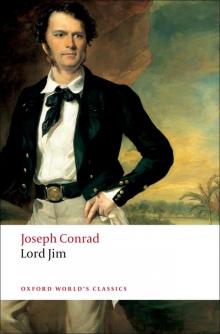 Lord Jim
Lord Jim The Nigger of the Narcissus (Echo Library)
The Nigger of the Narcissus (Echo Library) Victory (Dover Thrift Editions)
Victory (Dover Thrift Editions) Secret Agent
Secret Agent Nostromo
Nostromo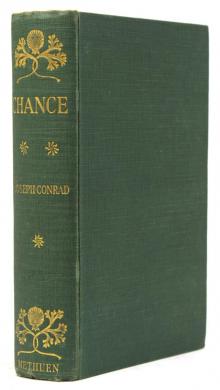 Chance: A Tale in Two Parts
Chance: A Tale in Two Parts Youth
Youth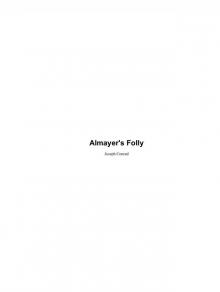 Almayer's Folly
Almayer's Folly The Heart of Darkness and the Secret Sharer
The Heart of Darkness and the Secret Sharer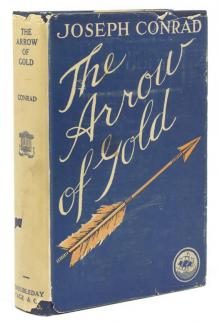 The Arrow of Gold: A Story Between Two Notes
The Arrow of Gold: A Story Between Two Notes The Rescue: A Romance of the Shallows
The Rescue: A Romance of the Shallows The Point Of Honor: A Military Tale
The Point Of Honor: A Military Tale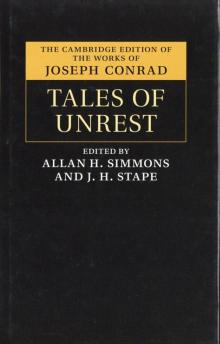 Tales of Unrest
Tales of Unrest Under Western Eyes
Under Western Eyes Gaspar Ruiz
Gaspar Ruiz A Set of Six
A Set of Six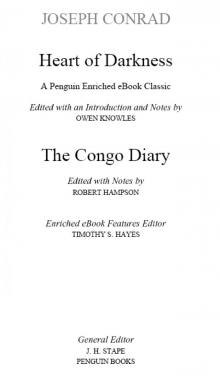 Heart of Darkness and the Congo Diary (Penguin Classics)
Heart of Darkness and the Congo Diary (Penguin Classics) Heart of Darkness and Selected Short Fiction
Heart of Darkness and Selected Short Fiction Typhoon
Typhoon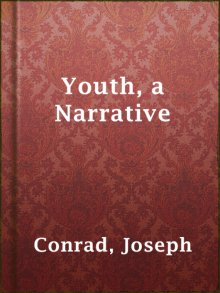 Youth, a Narrative
Youth, a Narrative Tomorrow
Tomorrow The Arrow of Gold
The Arrow of Gold The Shadow Line: A Confession
The Shadow Line: A Confession The Rescue
The Rescue Victory (Echo Library)
Victory (Echo Library) The Brute
The Brute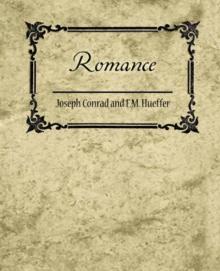 Romance
Romance A Personal Record
A Personal Record Lord Jim: A Tale
Lord Jim: A Tale Heart of Darkness and Selected Short Fiction (Barnes & Noble Classics Series)
Heart of Darkness and Selected Short Fiction (Barnes & Noble Classics Series) Within the Tides
Within the Tides The Secret Sharer and Other Stories
The Secret Sharer and Other Stories Falk
Falk Heart of Darkness and The Secret Sharer
Heart of Darkness and The Secret Sharer Chance
Chance An Anarchist
An Anarchist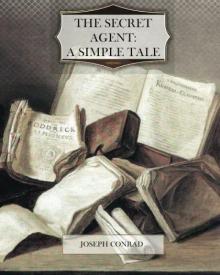 The Secret Agent: A Simple Tale
The Secret Agent: A Simple Tale The Secret Agent
The Secret Agent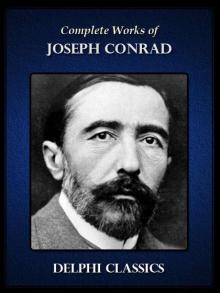 Complete Works of Joseph Conrad (Illustrated)
Complete Works of Joseph Conrad (Illustrated)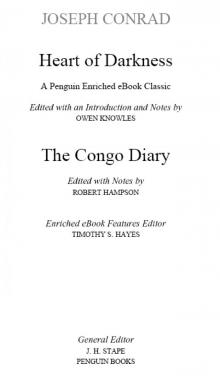 Heart of Darkness and the Congo Diary
Heart of Darkness and the Congo Diary Notes on Life & Letters
Notes on Life & Letters Typhoon (Single Story)
Typhoon (Single Story)